M a g a z i n e



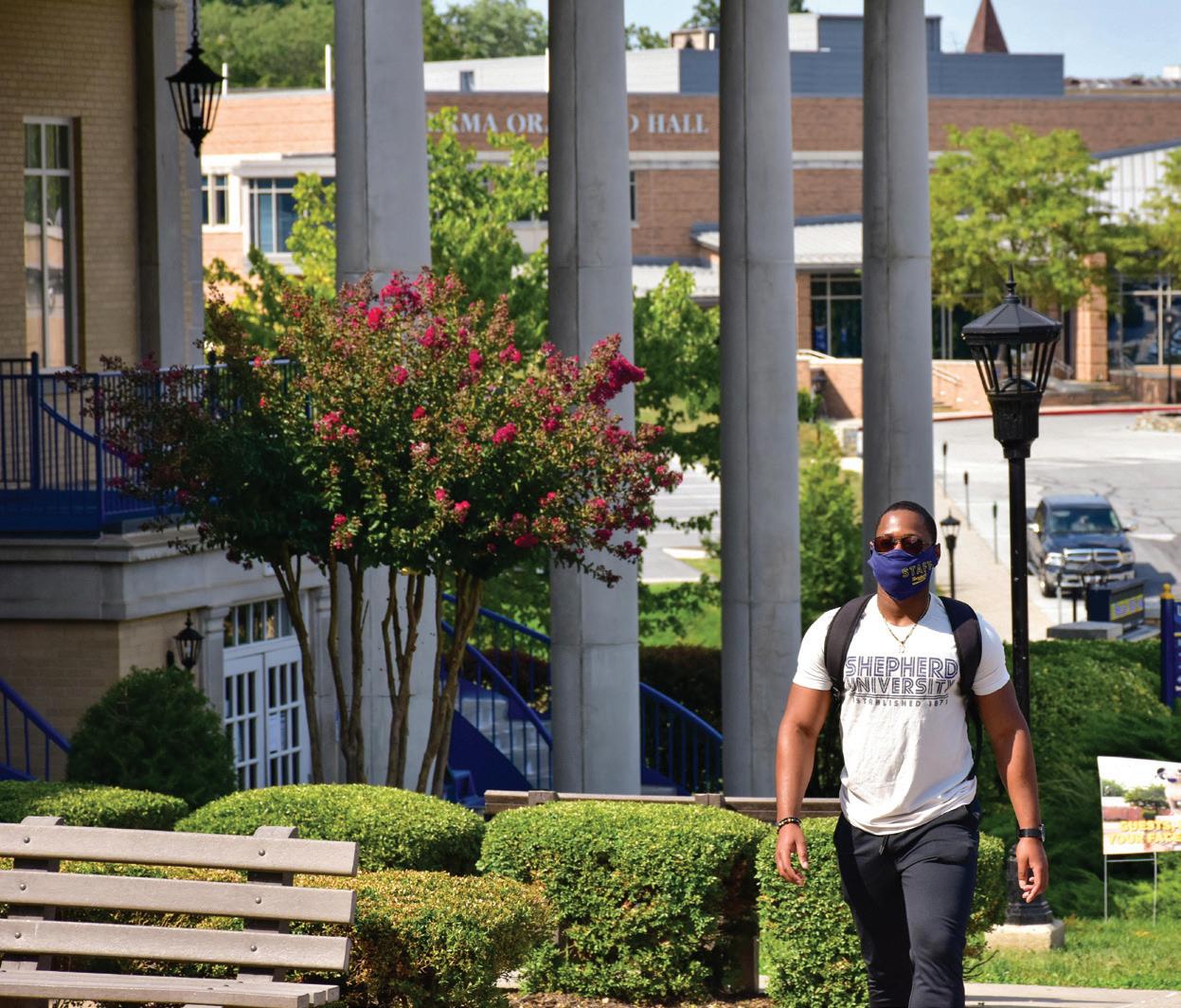











Dr. Chiquita Howard-Bostic was named associate vice president for diversity, equity, and inclusiv ity. Howard-Bostic reports to the president in her associate vice president role and serves on the Executive Leadership Team of the institution.
Howard-Bostic serves as a key leader on the Diversity and Equity Committee and participates in university strategic plan ning in the areas of diversity, inclusion, and social justice. She is working with the Office of Human Resources to integrate diver sity best practices into institutional employment and workplace practices and will propose institutional programming, includ ing faculty and staff training in developing cultural competen cies and cultivating and retaining future leaders from diverse backgrounds.
“The unique qualifications of Dr. Howard-Bostic in the areas of innovative academic course delivery, together with her com munity leadership on diversity and social justice issues and her development of new initiatives in criminal justice education, collectively bring an expertise to Shepherd University that will have a significant impact on our students, employees, and the community at large,” said President Mary J.C. Hendrix.
Working collaboratively with the Office of University Com munications, Division of Student Affairs, and Office of Human Resources, Howard-Bostic participates in developing commu nication strategies, employee and student training, and web resources to support diversity, inclusion, and social justice, and serves as the primary educator for the university on social equity issues, including orientation of new students.
She reviews, revises, or creates university policies address ing discrimination, harassment, and violence and contributes to the maintenance of a database of statistical, demographic, and subject matter data related to civil rights, social equity, and compliance.
Howard-Bostic, an associate professor of sociology, is the chair of the Department of Sociology, Criminology, and Crimi nal Justice. A member of the Shepherd faculty since 2013, she earned a Bachelor of Arts degree and a Master of Urban Plan ning from the State University of New York at Buffalo and a Ph.D. from Virginia Polytechnic Institute and State University in 2011.
She was awarded the 2015 Shepherd University Outstand ing Teacher Award and is featured on a READ poster in the Scarborough Library. Howard-Bostic received the Outstanding Service Award in 2017 and the Outstanding Academic Advi sor Award in 2020. She was the first recipient of Shepherd’s Storer College Award, which recognizes faculty members who incorporate diversity and social justice into their classroom, research, scholarship, and interaction with students.
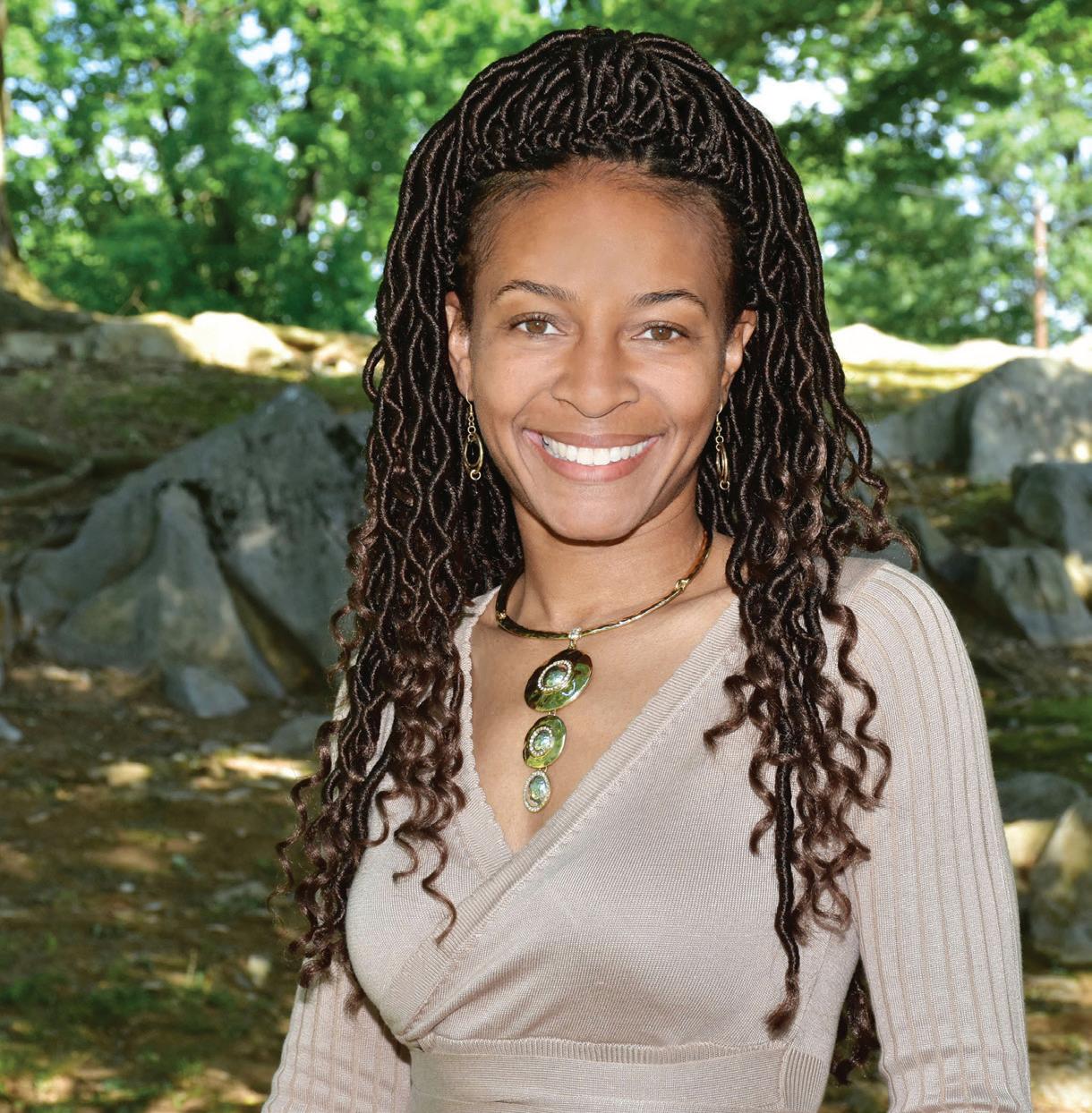
Howard-Bostic’s research and journal publications have advanced the study of transformational leadership, cross-cul tural motivations for aggression, and intimate partner violence. The studies also offer perspectives and innovative strategies that embrace equity and inclusion across race, class, gender, and accessibility. ¾
The Office for Diversity and Equity received a $5,000 West Virginia Higher Education Policy Commission Diversity for Equity grant to help improve student retention and access to textbooks while enhancing social and cultural capital and boosting the academic achievement of students from underrepresented groups.
A key component of the new Office of Diversity and Equity is a pilot program, Wisdom Inspires Student Excel lence (WISE), that pairs first-year students from popula tions that are generally underserved with mentors who are juniors and seniors for participation in a variety of enrich ing events on campus. The mentors will help students with networking, enhanced study plans, increased participation in diversity and inclusion activities, and will boost knowl edge building and leadership skill development.
Participants who complete activities will receive $50 to use toward a textbook and will work to complete the Lead ership for a Better World certificate. The Office of Diversity and Equity will also host WISE TALK, a monthly afternoon topic-focused discussion where mentors and mentees share their unique experiences on campus. ¾
Dr. Chiquita Howard-Bostic Cecelia MasonFrom the President 4
International student enrollment breaks record 5
Nursing students polish skills with clinical hours 6 Shepherd newsmakers 8
Allison receives Appalachian writer award 9
Class Notes 10
In Memoriam 12 New Arrivals 14 Weddings 15
Katie Gordon ’12 named alumni director 16 Outstanding alumna named 17
Four named to Athletic Hall of Fame 18 Spring season cut short by COVID-19 19
Foundation-sponsored events announced 21 New teaching delivery system implemented 22
Then and Now with Shepherd’s archives 24
The Shepherd University Magazine is published by the Office of University Communications and the Shepherd Univer sity Foundation for the Shepherd University community— alumni, donors, students, parents, prospective students, staff, faculty, and friends of the university. A portion of the produc tion cost is underwritten by the Shepherd University Foun dation and the Shepherd University Alumni Association.
Editor and Art Director Valerie Owens ’76 and ’86 Managing Editor Monica Lingenfelter
Contributors this issue: Chip Ransom ’86, Kristin Alexander, Cecelia Mason, Katie Gordon ’12, Alexandra Stevens ’13, Meg Peterson, BreAnne Rugh ’06, Cathy Nevy, Sylvia Bailey Shurbutt, William Ransom
Front Cover: COVID-19 changed the educational landscape dramatically during the fall semester with social distancing, face coverings, hybrid and online class offerings, and de-densification of classrooms and offices becoming the norm.
Photos by Alexandra Stevens ’13
Back Cover: The ram statue at Ram Stadium became part of a campaign that stressed the requirement that all students, employees, and guests wear a face covering while on Shepherd’s grounds and in buildings to stop the spread of COVID-19.
Photo and artwork by Alexandra Stevens ’13
ADDRESS CHANGES: Please contact BreAnne Rugh, Shep herd University Foundation database manager, 304-876-5195 or brugh@shepherd.edu.
Eric J. Lewis ’95 Chair Shepherdstown
Gat Caperton Vice Chair Berkeley Springs
Henry Kayes, Jr. Secretary Martinsburg
Ramon A. Alvarez ’62 Charles Town
Christopher S. Colbert ’95 President Shepherdstown
Timothy B. McShea ’80 Vice President Frederick, Maryland
Julia M. Connell ’84 Treasurer Charles Town
Karl L. Wolf ’70 Secretary Shepherdstown
Monica W. Lingenfelter Executive Vice President Hagerstown, Maryland
Arthur J. Auxer ’69 Shepherdstown
Jason S. Best Shepherdstown
Kenneth J. Boone ’76 Baltimore, Maryland
Ben Deuell ’08 Martinsburg
Pat Moler Egle ’60 Shepherdstown
Tammy Gill ’18 M.B.A. Shepherdstown
Heidi M. Hanrahan Shepherdstown
Jim Auxer ’69 President Shepherdstown
Sandra A. Sponaugle ’95 Past President Shepherdstown
Matthew Kradel ’99 Treasurer Martinsburg
Lynn Carr ’69 Mt. Airy, Maryland
David Decker ’89 Martinsburg
Jennifer Flora ’06 and ’08 M.B.A. Shepherdstown
Bassell Franks ’12 Martinsburg
Lyndsey Matschat ’06 Martinsburg
David Avella ’92 Arlington, Virginia
James M. Cherry ’96 Frederick, Maryland
Mona Kissel Classified Employee Representative Martinsburg
Taylor Seitzinger Student Representative Shepherdstown
Bob Marggraf Great Cacapon
Tia McMillan Shepherdstown
Elizabeth V. Rini Faculty Representative Shepherdstown
Mary J.C. Hendrix ’74 Shepherdstown
Darren B. Iden ’89 Winchester, Virginia
Brian K. Jackson ’87 Toluca Lake, California
Robert H. Jensenius ’72 York, Pennsylvania
Victoria M. Johnston ’90 Shepherdstown
Matthew P. Knott ’96 Harpers Ferry
Eric J. Lewis ’95 Shepherdstown Cecelia Mason Martinsburg
Mary Elizabeth “Liz” Oates Shepherdstown
Tony W. Price ’93 Shepherdstown
J. David Rickard ’56 Greensboro, North Carolina
Christopher K. Robertson ’89 Inwood
Mary Kathryn Robinson Winchester, Virginia
Janine Sam Shepherdstown
Stephen G. Skinner Charles Town
W. Gregory Snellings ’91 Frederick, Maryland
Gina Miller Walters ’10 Martinsburg
Alfred L. (Al) Young ’89 Arlington, Virginia
Directors emeriti Ramon A. Alvarez ’62 Charles Town
James A. Butcher Shepherdstown
Kenneth E. Harbaugh Williamsport, Maryland
Jane Ikenberry-Dorrier ’65 Scottsville, Virginia
Jerry P. Kerr ’68 Winchester, Virginia
Elizabeth S. Lowe ’52 Shepherdstown
Allen L. Lueck ’67 Shepherdstown
Susan Mentzer-Blair ’72 Knoxville, Maryland
David T. Newlin ’76 Winchester, Virginia
Michael A. Smith ’89 Middleburg, Virginia
Rachel Crum Moreno ’08 Harpers Ferry
Robin Moses ’88 Charles Town
Andrew Potts ‘17 Martinsburg
James Scott, Jr. ’70 Shepherdstown
Daniel Sweeney ’17 Martinsburg
Christine Thompson ’83 Winchester, Virginia
Cindy Vance ’88 Martinsburg
Directors emeriti Jim Auxer ’69 Shepherdstown
Scott Bradford Doleman ’95 Inwood
CLASS NOTES may be emailed to kswayne@shepherd.edu.
Robert “Bob” Fleenor ’74 Martinsburg
Paul Hillyard ’58 Winchester, Virginia
Lynn Leatherman ’92 Falling Waters
Tripp Lowe ’95 and ’97 Shepherdstown
Francine Phillips ’82 Shepherdstown
Charles VanMetre ’56 Shepherdstown
Nelson Vazquez ’86 Forston, Georgia
Chris Wooten ’87 Fallston, Maryland
Digital images must be at least 300 dpi.
From the PresidentAll summer long, faculty, staff, and administrators planned for a successful reopening of Shep herd for the fall semester, prob lem solving on the fly the many issues con fronting us. Closing campus and teaching remotely midway through the spring semes ter due to the COVID-19 pandemic proved that we could quickly retool our academic delivery in the face of an extreme challenge. Without question, we have learned a great deal throughout this journey—especially about ourselves.
Sam LevitanThree programs at Shepherd have received reaccreditation during 2020.
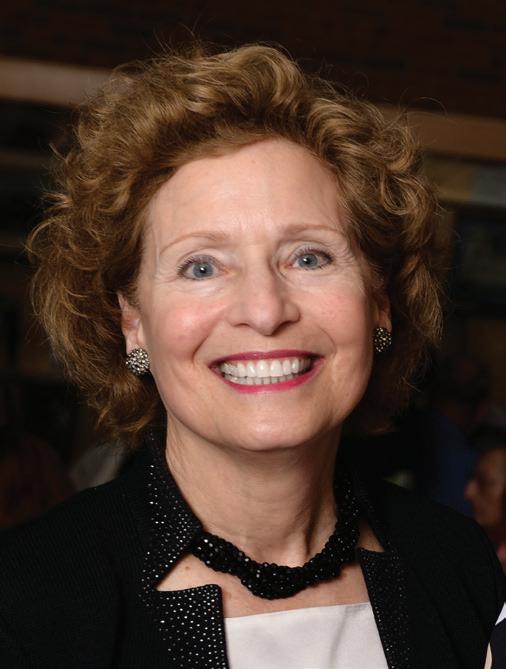
Shepherd’s Campus Health Task Force, under the capable leadership of Holly Morgan Frye ’09 M.A., vice president for student affairs, has been meeting since January and continues to meet twice a week to address all aspects of the adverse effects of COVID-19 and to plan for the spring semester.
Our academic leaders have developed a strategic plan for instructional deliv ery, which consists of a thoughtful hybrid model of in-person and online modal ities—in order to de-densify the number of individuals in a classroom—allowing us to follow social distancing guidelines. Everyone on campus is expected to wear a face covering. All facilities are disinfected daily; mandatory daily health screen ings are in effect for all employees and students; helpful signage directs the flow of traffic within buildings to respect social distancing; hand sanitizers are readily available throughout buildings on the campus; and air handling systems are being modified to block the potential airborne distribution of the virus. Residential halls have just one student per room, unless two students had requested to room together and agreed to follow safety guidelines. Most importantly, contingency plans have been made for quarantining students.
The fall semester has been modified with in-person instruction ending Novem ber 24, followed by students returning home to take their final exams online. The spring semester has also been modified: it will start a week later, the day after Martin Luther King Day, and spring break has been canceled in order to reduce high-risk travel/vacations.
Our safety procedures and planning seem to have paid off—as I write this mes sage in mid-October, Shepherd has no active COVID-19 cases with 28 individuals who have recovered. This is due in large part to our students and employees who have diligently worn face coverings on campus and in the classroom, while prac ticing social distancing to stop the spread.
We are most fortunate that Shepherd University is located in Shepherdstown— not only is it the oldest town in West Virginia but also the most progressive. We collaborate closely with the community in sharing knowledge, resources, and good will. Many members of the community helped us with our plans to reopen, includ ing Mayor Jim Auxer ’69, who serves on our Campus Health Task Force.
Even in times of adversity, Shepherd continues to train the next generation of leaders and model citizens. Should there be another pandemic in their lifetimes, our students will know what to do because of what we have been through together. ¾
The Council for the Accreditation of Edu cator Preparation (CAEP) has granted full accreditation to the School of Education through spring 2025. CAEP initially accred ited the School of Education in 2018, with the stipulation that improvements be made within two years to use multiple indica tors and technology-based applications to establish, maintain, and refine criteria for selection, professional development, perfor mance evaluation, and continuous improve ment and retention of mentor teachers in public school systems the education depart ment partners with to train teachers.
The International Accreditation Council for Business Education (IACBE) has reaffirmed the accreditation of Shepherd’s Bachelor of Science in business administration and the Master of Business Administration (M.B.A.) programs.
The final report from the IACBE site visit team lauded the programs in three areas of recognition: the creation of a College of Business for a stronger presence with stu dents, alumni, and community; experiential and active learning built into the programs; and the engagement with local business community.
The Social Work Program accreditation has been reaffirmed for eight years by the Council on Social Work Education. CSWE is recognized by the Council for Higher Education Accreditation as the sole accred iting agency for social work education in the United States. CSWE’s decision to reaf firm accreditation for eight years means that the program has met or surpassed all educational and accreditation policy, and no follow-up or progress reports need to be filed. ¾
Planning the fall semester during a pandemic and surviving uncertain times
The number of international students at Shepherd Uni versity has more than doubled in the past four years, with 62 enrolled this year compared to 28 in 2017. This is the most international students attending the university since the program began.
Dr. Lois Jarman, director of international affairs, said Shep herd has been successful in attracting more students from other countries by concentrating recruiting efforts on West Africa and by developing relationships with embassies in Washington, D.C.
She credits Siriki Diabate ’14 and ’16 M.B.A., international admis sions counselor, for taking advantage of Shepherd’s proximity
to Washington, D.C., and form ing partnerships with embassies from the Ivory Coast, The Gambia, Benin, Mali, and Niger.
“We have programs and activi ties that have echoed very positively with those embassies, such as host families and International Student Leadership Awards,” Diabate said.
Diabate said he has also worked with officials from various coun tries that award scholarships so students can study abroad.
“I went to those ambassadors and invited them to visit campus so that they know Shepherd,” Diabate said. “I brought eight ambassadors here, and all eight like Shepherd.”
At least 16 international students are from West Africa. Others are from various countries in Asia, Europe, Latin Amer ica, and the Middle East.
The increase in international students means Shepherd’s English as a Second Language (ESL) program has also grown and is larger than it’s ever been. Diabate said currently there are 15 students enrolled in ESL classes.
Youssouf Bakayoko, a business administration major from Ivory Coast, remembers being confused and faced with a cul ture he wasn’t used to during his first days at Shepherd.
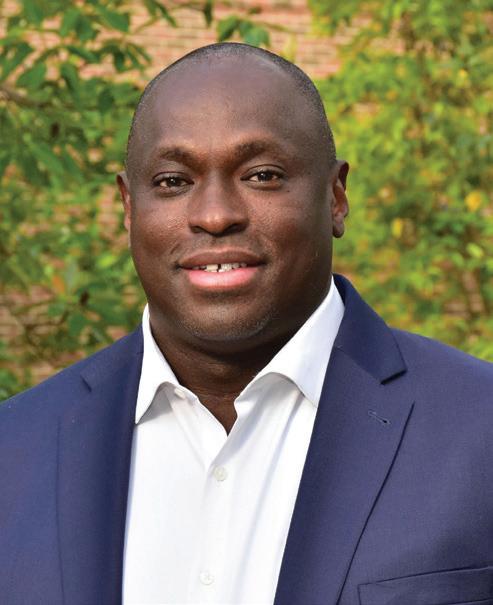
“I was lucky to be in this community of wonderful students from all over the world,” Bakayoko said. “The community welcomed me warmly and helped me in many ways such as language, culture, and how to become a leader. Time has also allowed me to get friends with whom I have shared unforget table moments.”
Audrey Assamoa, an accounting major from Ivory Coast, also encountered many challenges when she first arrived.
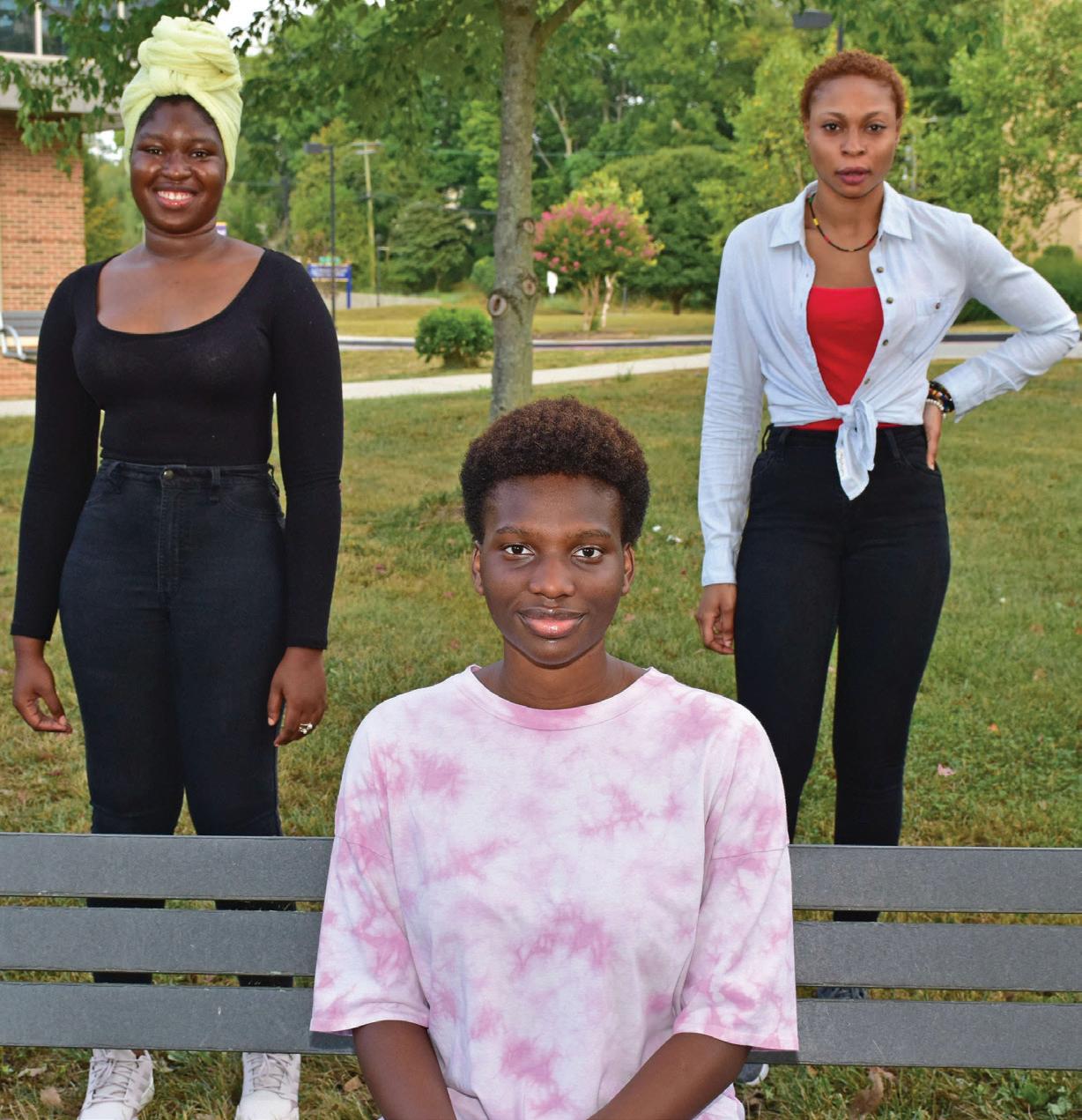
“At first I was shy because I did not know anyone and I did not know how to express myself properly in English,” Assa moa said. “In addition, I missed my friends and family. But over time, I blossomed. Indeed, I met some great people and friends at Shepherd University. I learned to surpass myself and discover the leadership in me.”
“I have nothing but good memories of my freshman year among Shepherd’s international community,” said Kady Sanogo, a psychology major from Mali. “From the start they’ve made me feel at home, which meant a lot considering I was miles away from my actual home. It’s a welcoming community that not only helps you ease into the college life and even pre pares you for life after college, but also helps you make lifelong memories and friends.”
Jarman said international students enjoy hosting activi ties that highlight their culture, such as Chinese New Year and Diwali celebrations. Plans for continued expansion of the program include offering more cultural programs, developing exchange programs with universities in other countries, and West African study abroad opportunities for Shepherd students from a variety of majors. Jarman said one of the best recruit ment tools is making sure each international student has the best possible experience while studying at Shepherd.
“Students who are happy tell students in their home coun tries, they tell family members, and they post on social media about the experiences they are having,” Jarman said.
¾ Cecelia Mason
ABOVE: Among the 62 international students attending Shepherd are (seated) Kady Sanogo, psychology major, Mali, (standing, l. to r.) Fatoumatta Conteh, chemistry major, The Gambia, and Larissa Fatou Mendy, business administration major, Ivory Coast. Siriki Diabate ’14 and ’16 M.B.A. Cecelia MasonThe COVID-19 pandemic has placed a spotlight on healthcare practitioners. Programs such as Shepherd University’s School of Nursing play a big role in pre paring those practitioners for the job of taking care of patients suffering from all kinds of health issues.
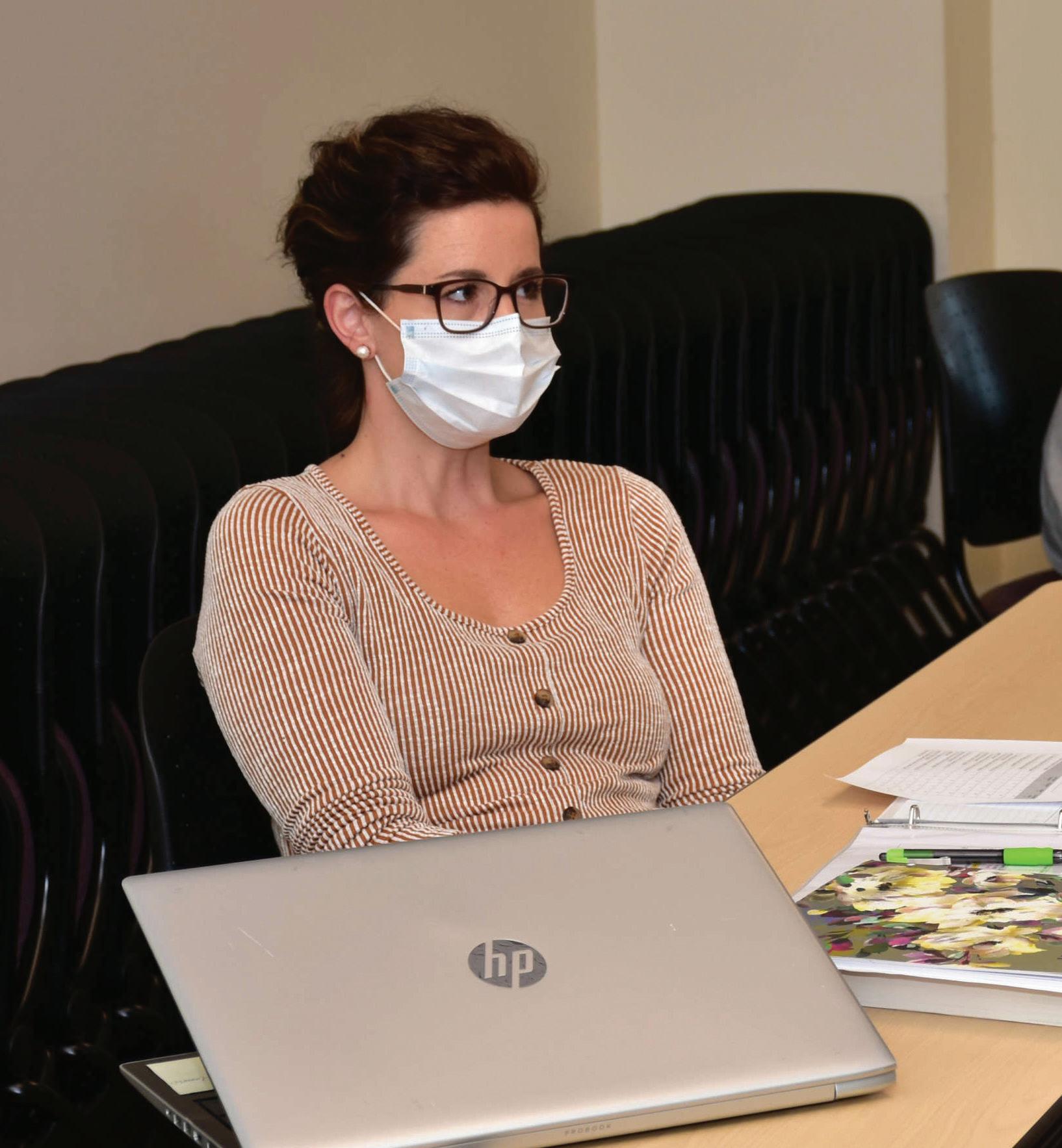
“Our nurses and nurse practitioners are on the frontline of giving care during this epidemic of opioid abuse and the COVID-19 pandemic,” said Dr. Sharon Mailey, dean, College of Nursing, Education, and Health Sciences, and chair, School of Nursing.
For the 2020-2021 school year, there are 31 Doctor of Nurs ing Practice (D.N.P.) students, 137 Bachelor of Science in Nurs ing (B.S.N.) students, and 205 pre-nursing students, making nursing one of the largest degree program on campus.
A key component of earning a D.N.P. or B.S.N. is gaining experience in one of the healthcare facilities located through out the region. Undergraduate students must fulfill 610 clinical direct patient care hours to sit for the National Council State Boards licensure exam to become RNs. Graduate students per form 1,080 clinical hours. Mailey said the School of Nursing has 60-70 affiliation agreements with facilities where D.N.P. and B.S.N. students can complete their clinical hours.
“At the graduate level, in order to be certified as a nurse
practitioner, you must have more than 600 clinical hours that are one-on-one with a preceptor provider,” Mailey said. “These cannot be simulated; they must be direct patient care encoun ter hours. Our students work with physicians and nurse prac titioners in the region to gather the essential clinical knowledge they need as they begin their practice.”
The two largest facilities the School of Nursing works with are Winchester Medical Center in Winchester, Virginia, and Meritus Health in Hagerstown, Maryland. Both are in the American Nursing Credentialing Center Magnet Recognition Program®
“It’s foundational for the practice of nursing that we have those close affiliations, and we are blessed to be able to work with two magnet hospitals that embrace us,” Mailey said.
“Shepherd University is extremely proud of the exceptional School of Nursing—its stellar reputation, compassionate out reach, distinguished faculty, and dedicated students,” said Pres ident Mary J.C. Hendrix. “The ability to partner with local area hospital systems is particularly rewarding—the benefits are reciprocal in terms of the noteworthy experience for stu dents and patients.”
Clinical hours for both undergraduate and graduate stu dents include rotations in the whole array of services offered in primary care sites and an acute care hospital, such as ger ontology, primary care, adult care, women’s health, pediatrics, mental health, emergency care, intensive care, and medical sur gical care.
“Students have a well-rounded experience when they gradu ate from Shepherd,” Mailey said.
“Clinical has been a vital component of my nursing edu cation, professional development, and critical thinking,” said Maria Acevedo-Cabrera, a B.S.N. major from Shepherdstown, who worked in an extern summer program at Winchester Medical Center. “It allows me to have a better understanding of what is being taught to me in the classroom. It gives me the opportunity to have a little taste of what nursing is all about.”
Acevedo-Cabrera said the clinical experience she gained at Winchester Medical Center has helped her grow as a nurse, and she has learned an immense amount of information that is criti cal to patient-centered care. Jacob Stout, a B.S.N. major from Falling Waters, did a clinical rotation at Brook Lane Health Services in Hagerstown, Maryland, working with adolescents who are struggling with mental illness.
“This clinical experience has allowed me to take a step out side of the textbook and classroom discussions and step into
LEFT: Doctor of Nursing Practice student Kristi Ashton of Martinsburg attends a class on photobiomodulation. OPPOSITE PAGE: On August 25, the School of Nursing hosted a White Coat Ceremony for students entering the Doctor of Nursing Practice program. Due to COVID-19, the socially distanced ceremony took place in the atrium of Erma Ora Byrd Hall with only the students present.the actual environment in which a psychiatric registered nurse would work,” Stout said. “Having a chance to apply your newly learned skills within a real-world clinical setting is a great way to solidify your skill set, gain invaluable experiences, and immerse yourself into the culture of nursing. Working to help and interact with patients struggling with mental illness has been nothing short of memorable and rewarding.”
Payton Barr, a B.S.N. major from Franklin in his final semes ter of the nursing program, also worked as a summer extern at Winchester Medical Center, producing a capstone project on the Post Anesthesia Care Unit.
“The experience has been very fulfilling,” Barr said. “I learn something new every day and will be able to perform the duties of a nurse after I graduate. Without my capstone experience, I would imagine the transition from student to nurse would be very difficult.”
D.N.P. student Kristi Ashton’s clinical hours consist of seeing patients at the Tri-State Community Health Center in Berke ley Springs, treating them for everything from strep throat to muscle spasms, removing ingrown toenails, and giving immu nizations. Ashton, of Martinsburg, envisions a career in public health once she earns her advanced practice degree.
“The clinical is a tremendously valuable experience,” Ashton said. “I’ve met people of all demographics with a variety of complex medical problems and that has been a good exposure medically. I would love to work at Tri-State or Shenandoah Community Health. I just know I can make a real difference in the lives of the patients who go there.”
During clinicals, nursing students are assigned to nonCOVID-19 units and efforts are taken to make sure they are not directly caring for COVID patients. Personal protective equip ment such as masks, goggles, face shields, and N95 masks are issued to students when they go to clinicals. Mailey said gradu ate students, who are working with primary care patients, may
encounter COVID patients with symptoms due to the nature of their practice site.
“Our D.N.P. students are all registered nurses and all of them are in the work environment, so they are among the heroes,” Mailey said. “They’re on the front lines taking care of patients in those environments.”
COVID-19 is not the first health crisis Shepherd nursing students have faced as they’ve worked toward their degrees. Mailey points out the learning experiences offered in the School of Nursing prepares students to go into any environment, and in the past, they’ve had to deal with other diseases such as Ebola and MRSA that require training with personal protective equip ment. She calls Shepherd’s nursing program an essential pipe line to healthcare in the region, whether there’s a pandemic or not.
“We are a feeder school to all the hospitals in the region and there’s a shortage of primary care providers, so our nurses and advance practice providers are essential for the needs of the most vulnerable population in the area,” Mailey said. “The health care indices of obesity, diabetes, COPD, and opioid abuse are also significant and having this program helps address some of the needs of the population. We’re just thrilled we can be sup portive of the health agencies and the population, and we’re very proud of the individuals who have graduated.”
In addition to gaining experience in medical facilities, Shep herd nursing students work in conjunction with the West Vir ginia Attorney General’s office in the local school system to deliver a message to children about the adverse effects of opi oids and the hazards of vaping, and they have worked with the local health department with needle exchange programs and conducting the annual Point in Time homeless count. They also helped with the mandatory COVID-19 testing for 2,500 Shepherd students and employees that was conducted at the beginning of the school year in August. ¾ Cecelia Mason
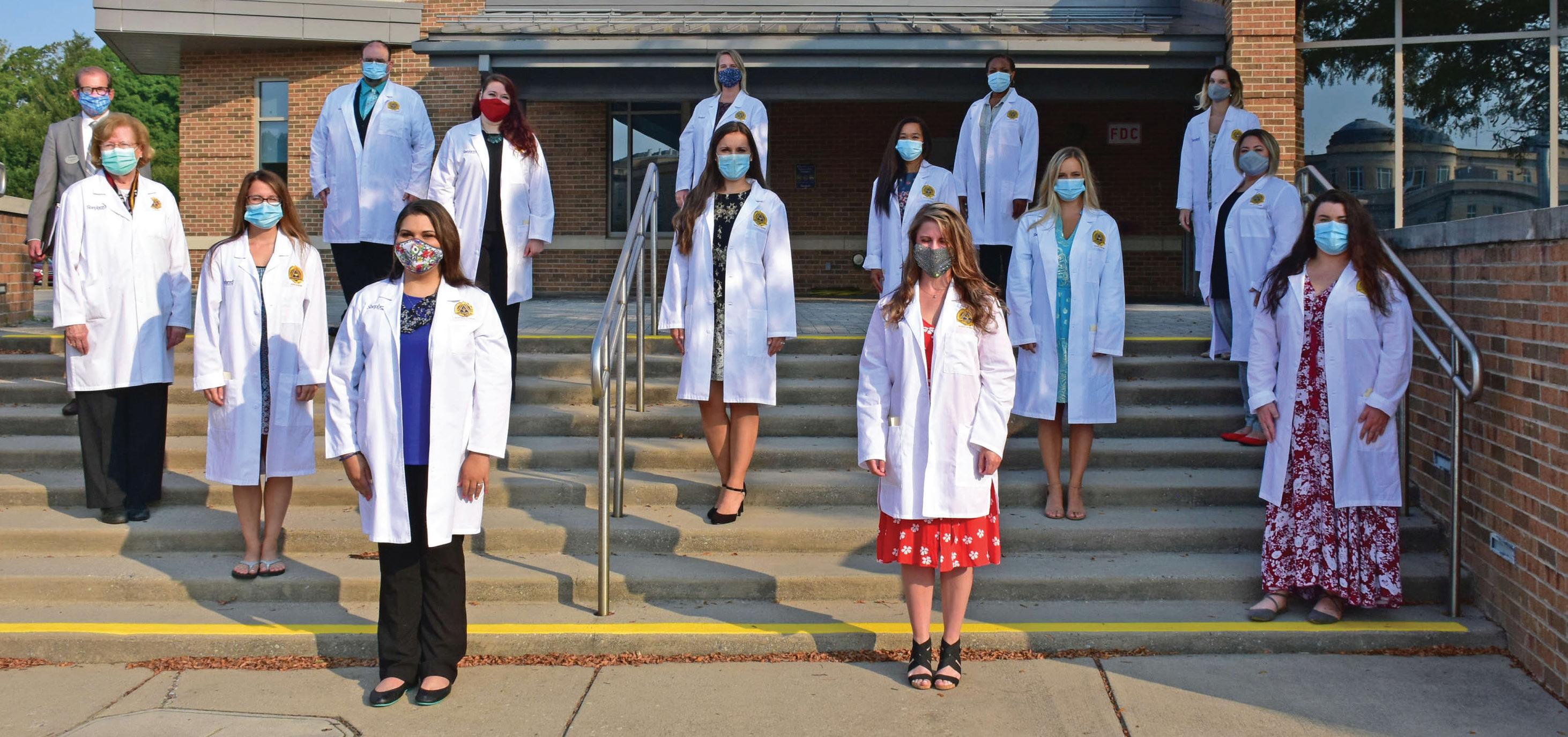
Dr. Jeff Groff, chair of the Department of Environmental and Physical Sciences, has been named the Faculty Merit Foundation of West Vir ginia 2019 Professor of the Year. The Foundation made the announce ment after its annual spring banquet had to be canceled due to the COVID-19 pandemic.
“This is the highest professional honor of my life, and the honor needs to be shared with my colleagues, family, and friends who sup ported me, and the students who inspired and challenged me,” Groff said. “I’d like to thank the board of the Faculty Merit Foundation of West Virginia for this honor and the work they do to recognize the many outstanding faculty in our state. I’d also like to recognize the other four finalists whose achievements were truly humbling.”
Shepherd University received a $1,309,440 grant from the U.S. Depart ment of Education to continue its TRIO Student Support Services (TRIO SSS) program for the next five years. This is the third consecutive TRIO grant awarded to the university.
TRIO SSS is open to students who are income eligible, first gen eration, or have a documented disability under the Americans with Disabilities Act that can be verified by Shepherd’s Disability Support Services office. Cynthia Copney, director of TRIO programs, said she is excited the grant will support the program’s continuation. TRIO SSS will assist 165 students each year, offering services such as academic tutoring, financial aid and financial literacy, educational workshops, peer mentoring, and career counseling and planning.
The Department of Environmental and Physical Sciences is using a $6,700 grant from the Corporation of Shepherdstown to monitor water quality in the Town Run.
Dr. Jeff Groff, department chair, and Dr. Peter Vila, associate pro fessor of environmental and physical sciences, have installed a moni toring station on the run that will show water and discharge levels and will measure oxygen, pH, temperature, and conductivity. The station is solar powered and will upload the data to the web using Wi-Fi.
The Potomac River is Shepherdstown’s primary water source and the Town Run is its secondary water source, so the new monitoring station will benefit both the town and the university.
“Shepherdstown is delighted to be a partner in this project that shows the value of a positive town-gown relationship,” said Jim Auxer ’69, Shepherdstown mayor. “The daily information gained from the monitoring system of our secondary water source has proven to be invaluable in improving water quality.”
The grant covers the cost of the equipment and a stipend for a stu dent to help with the project. The monitoring station will also benefit students in several classes, such as Stream Ecology, Hydrology, Appli cations of Electronic Monitoring, and Physical Computing.
The National Science Foundation has awarded a one-year $99,999 planning grant to Shepherd University to develop a comprehensive plan to cost effectively connect the university to the Internet2 national backbone.
“This planning grant will support Shepherd’s exploration of the fea sibility to connect to Internet2,” said Dr. Robert Warburton, dean, Col lege of Science, Technology, Engineering, and Mathematics. “We are confident of a positive outcome and that by taking advantage of the potential 100 times faster data connection we will be able to enhance multiple degree programs at Shepherd and across the region.”
Internet2, a not-for-profit consortium devoted to building the next generation of internet based on fiber optics, was founded by the nation’s leading higher education institutions in 1996. It is made up of universities, corporations, and governments from the United States and more than 100 other countries, and serves 317 U.S. universities, 60 government agencies, and 43 regional and state education networks.
Universities that are part of Internet2 include the University of Maryland, Carnegie Mellon University, Penn State, Virginia Tech, George Washington University, and West Virginia University. Jason Miller, assis tant professor of computer information science, said for Shepherd to join Internet2, it would require an optical fiber connection from campus to some already-connected institution.
If Shepherd can join Internet2, the enhanced connectivity will allow the university to expand its research and educational offerings in STEM and other disciplines.
Shepherd University is one of the 142 best colleges in the Southeast according to The Princeton Review. The education services company lists Shepherd on the Best in the Southeast section of its “2021 Best Colleges: Region by Region” website feature that posted August 18 at www.princetonreview.com/bestSEcolleges.
In its website profile, The Princeton Review and the students sur veyed describe the college as being “very much affordable, especially to in-state students, without compromising on opportunity” and com mends Shepherd for being “big on community service and community in general, including both within Shepherd and in the surrounding area.”
Shepherd University has been named a 2019 Tree Campus USA by the Arbor Day Foundation. Tree Campus USA is a national program launched in 2008 to honor colleges and universities and their leaders for promot ing healthy trees and engaging students and staff in the spirit of con servation. Shepherd joins 364 campuses across the United States des ignated as a 2019 Tree Campus USA.
To obtain this distinction, Shepherd met the five core standards for effective campus forest management, including establishment of a tree advisory committee, evidence of a campus tree-care plan, dedicated annual expenditures for its campus tree program, an Arbor Day obser vance, and the sponsorship of student service-learning projects. ¾
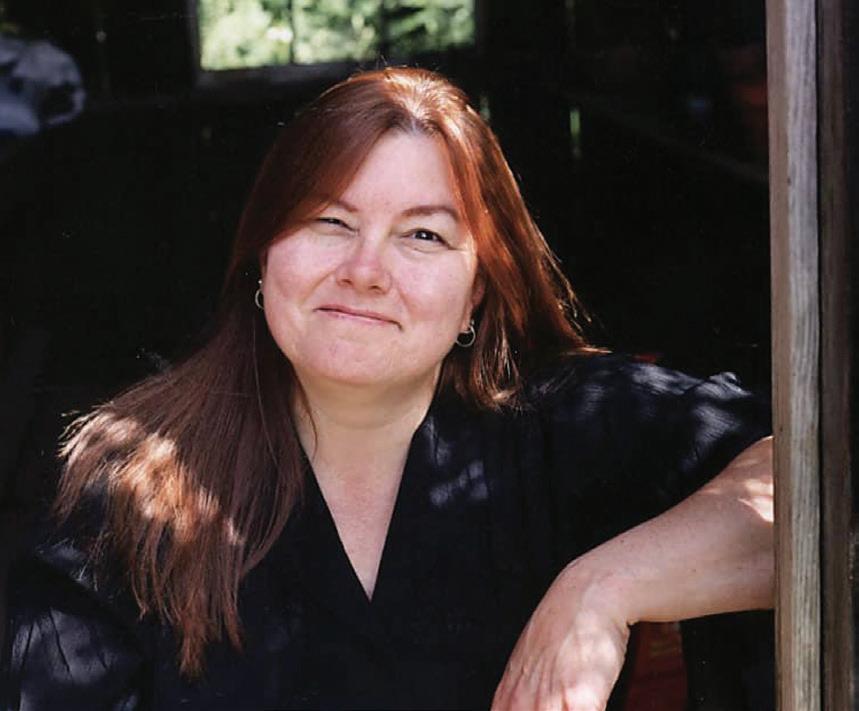
Dorothy Allison was born in Greenville, South Caro lina, in 1949. She writes in “History Is a Weapon” that she was “the bastard daughter of a white woman from a desperately poor family, a girl who had left the seventh grade the year before, worked as a wait ress, and was just a month past 15 when she had me.” Her mother, Ruth Gibson Allison, little more than a child herself when Dorothy was born, was from a family on the wrong end of White Horse Road in Greenville, labeled “rednecks” and written off even as they were ste reotyped and “othered.”
“My people were not remarkable,” she writes in the essay History. “We were ordinary, but even so we were mythical. We were the they everyone talks about—the ungrateful poor.”
Allison writes about spending the early part of her life trying to outrun this stereotype and the label “bastard.” Her mother married when she was a year old, but her husband died shortly after her younger sister was born. When she was five, her mother married her stepfa ther who molested Dorothy on the night her mother gave birth less than a year later, as the two girls waited with their stepfather in the parking lot of the hos pital. The molestation continued until Dorothy was 15.
When Dorothy was eight, her mother left her stepfather, whom she thought to be abusive but not a sexual predator, only to return two weeks later, telling her daughter that she “had no choice” since she could not support the girls alone. When Dorothy was 11 she told a cousin that her stepfather had sexually abused her, and her mother Ruth, who had always championed her daughter and was the only person in the family who believed Dorothy, left again, and
again returned to her husband, even tually leaving Dorothy with her aunt. Allison could never understand why her mother would not leave her stepfa ther and later wrote in “History” about their perennial poverty: “My stepfather worked as a route salesman, my mama as a waitress, laundry worker, cook, or fruit packer. I could never understand, since they both worked so hard and such long hours, how we never had enough money, but it was also true of my mama’s brothers and sisters who worked hard in the mills or furnace industry.”
When Allison was 13, the family moved to Florida. She recalls taking every scholarship exam she could find and winning a National Merit Schol arship to attend Florida Presbyterian College (now Eckerd College), where she graduated in 1971 with a B.A. in anthropology. After graduation, she moved to Tallahassee so that she could earn the funds to go to graduate school, becoming the editor of the feminist pub lication Amazing Grace and attending a few graduate classes in anthropology. But the real revolutionary moment for her during these years was coming out as a lesbian and discovering who she was beyond the label “white trash.” To facilitate both, she became involved with the Women’s Collective in Talla hassee and immersed herself in femi nist theory—these two events changed her life. Later she moved to Washing ton, D.C., and then to New York City to work as an editor and activist and to finish a master’s degree at NYU.
It would be years in the making, but eventually her first novel Bastard Out of Carolina (1992) would be a “way to claim [her] family’s pride and tragedy, and the embattled sexuality [she] had fashioned on a base of violence and abuse.” The book was a finalist for a National Book Award in 1992 and winner of the Ferro-Grumley Award.
Dorothy Allison’s second novel
Cavedweller (1998) is a story of redemption for the mother figure, as well as a revisioning of the myth of “white trash.” Allison has taken the concept of “they” and the stereotypes of “other” that underpin rigid concepts of class, race, and gender, in order to explore them in her prose and poetry, to expose the lies that they create to facilitate exclusion, prejudice, hateful ness, and harm. It is a scenario that still often occurs when the media write about the Appalachian region. Allison’s essay collection Skin: Talking about Sex, Class, and Literature, her poetry collec tion The Women Who Hate Me, and her award-winning short story collection Trash are relentless in pointing out such stereotyping and prejudice. Her work is fearless, and her storytelling gives us recipes for survival.
¾ Sylvia Bailey ShurbuttDorothy Allison began serving this spring as Shepherd University’s Appalachian Heritage Writer-in-Residence and as the 2020 state common read author. During her residency, she selected winners of the West Virginia Fiction Competition sponsored by the West Virginia Center for the Book, presented sev eral virtual presentations in September, and received the Appalachian Writer-in-Resi dence award.
Dorothy Allison“I want to break the heart of the world . . . and then heal it.”
• Dorothy Allison
Patrick Murphy has been hon ored with the West Virginia Governor’s Arts Award for his efforts with the Boys and Girls Club of the Eastern Panhandle, where he teaches the art of photography to students. Pat has volunteered with the organization for nearly 50 years. In his program, students learn how to shoot with both film and digital cameras, and practice landscape, portrait, macro, and stilllife. These photos are evaluated and the highest scoring are entered at a local youth fair and in a national photogra phy competition where the organiza tion has historically taken Best in Show awards. There is a traveling gallery of almost 50 years-worth of student work.
ground. He began his banking career at MNC Financial Inc., the parent company of Maryland National Bank, where he held various positions in finan cial management over a 10-year period. In 1993, he joined Allfirst Bank where he spent 10 years, ultimately becoming executive vice president and controller. Following his work at Allfirst, Bob held controller positions at the Wall Street Institute International and Bay Bank.
He joined Damascus Community Bank as CFO in 2014 and was later named active co-CEO until it was acquired by Old Line Bank. He then became exec utive vice president and CFO of Mary land Financial Bank in Towson, Mary land. Bob received his Bachelor of Sci ence degree in accounting from Shep herd and is a Certified Public Accoun tant in Maryland.
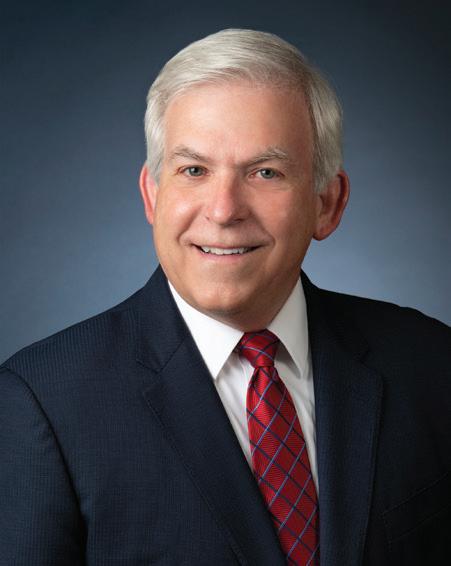
felt joining the Navy Reserve was one more way to serve his country.
Sharon Decker Affinito retired from the Loudoun County, Virginia, Department of Transporta tion in December 2019. Sharon spent nearly 30 years working for Loudoun County, serving the last 20 years as the transportation demand management specialist, developing marketing mate rials to promote commuting alternatives for residents, employees, and visitors.
Sharon has managed multiple grants, toll revenue projects, and promotional campaigns—some of which won awards at national, state, and regional levels.
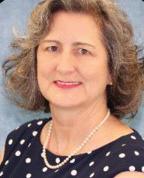
Sharon’s daughter, Claire Affinito ’19 and ’20, is also a Shepherd alumna, gradu ating in 2019 with a degree in history, and again in 2020 with a degree in sec ondary education.
Robert L. “Bob” Carpenter, Jr. has been named chief financial officer (CFO) and executive vice president of Howard Bank and of its parent company, Howard Bancorp. Bob has served as interim CFO of the bank and the parent company since Feb ruary 3. He has more than 30 years of financial services experience and reports directly to the chairman and CEO of Howard Bank. During his career, Bob has developed extensive knowledge in the areas of strategic planning, merg ers and acquisitions, financial analysis, and internal and external management reporting, and the ability to be effec tive at the big picture level and on the
Charles Hickok, M.D., became a commissioned officer in the U.S. Navy Reserve 37 years after grad uating from Shepherd. After becoming aware that the Navy Reserve needed anesthesiologists, he contacted his local Navy recruiter and was sworn in as a Lieutenant Commander in October 2018. He is currently assigned with a forward deployed medical unit which supports the Marines by providing combat casualty care to Marines and sailors. Charles attended West Virginia University School of Medicine, gradu ating in 1987, and has been providing anesthesia care in the Washington, D.C., region for the past 29 years. He says he
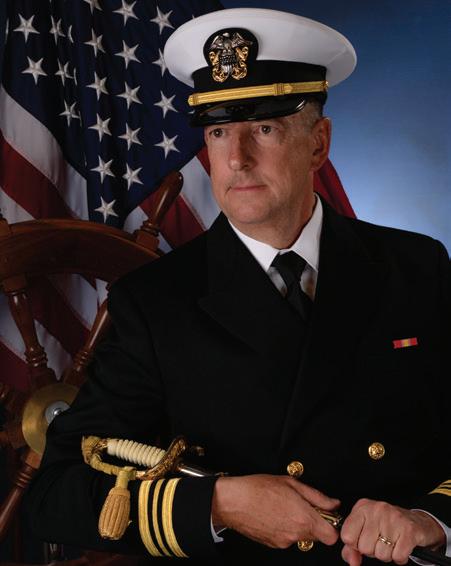
John ’84 and Kim Mason ’91, along with their daughter, Ashley, have opened Charlotte’s Café, located at 495 S. Washington Street in Berkeley Springs. They offer breakfast and lunch service, as well as the abil ity to book private parties and group events. You can find more information about Charlotte’s Café at charlottes cafewv.com/ or on their Facebook page. Both John and Kim are graduates of the business administration program, and John played baseball while at Shepherd.
Donna Newman received her Doctor of Executive Lead ership from the University of Charles ton. She is also “Mimi” to one-year-old Malakai.
Stephen Denton was appointed chief execu tive officer (CEO) of Ware2Go, an ondemand fulfillment platform owned by UPS that helps merchants enhance their delivery experience. This appointment was effective February 3. Stephen is an industry leader who has successfully led the acquisitions and integrations of 12 organizations in various industries.
’88
’75
Previous to this appointment, Stephen served as general manager and vice pres ident of Marketing Solutions at eBay, operated as president and chief revenue officer at Collective, served as CEO and president of GSI Media Division, was president of LinkShare and Rakuten USA, and has also held leadership posi tions at FedEx, The Baltimore Sun, and PepsiCo. Stephen graduated from Shep herd with a bachelor’s degree in business administration and marketing.
’00Brad Hoffman, CPA, was named co-managing partner of CPA/business advisory firm DeLeon & Stang. This change comes as founding partner, Allen DeLeon, retired after 35 years. The firm has offices in Maryland and Virginia. Brad joined D&S in 2012 and has been partner-incharge of the firm’s Leesburg, Virginia, and Frederick, Maryland, offices where he provides tax, M&A, and other con sulting services to a wide variety of clients.
William Scott Russell ’00, of Leesburg, Virginia, has been named a recipient of the 2020 Southeastern Region Art Educator Award by the National Art Education Association (NAEA). This prestigious award, determined through a peer review of nominations, honors one outstanding NAEA member from each of the four regions for outstand ing service and achievement of regional significance during previous years. Wil liam graduated from Shepherd with a
bachelor’s degree in secondary educa tion. He was also honored in 2018 as the Virginia Art Educator of the Year by the Virginia Art Education Associa tion (VAEA), as well as being named a VAEA Distinguished Fellow.
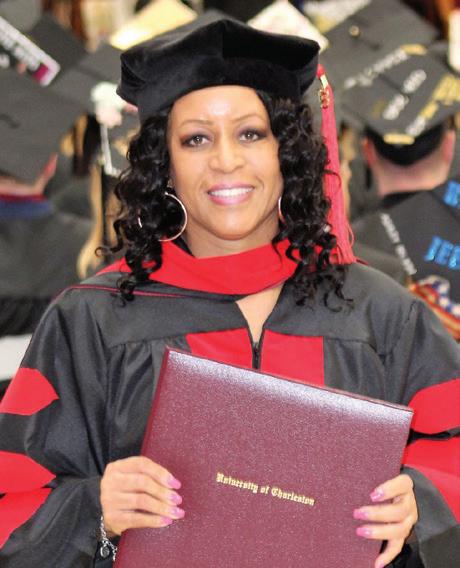
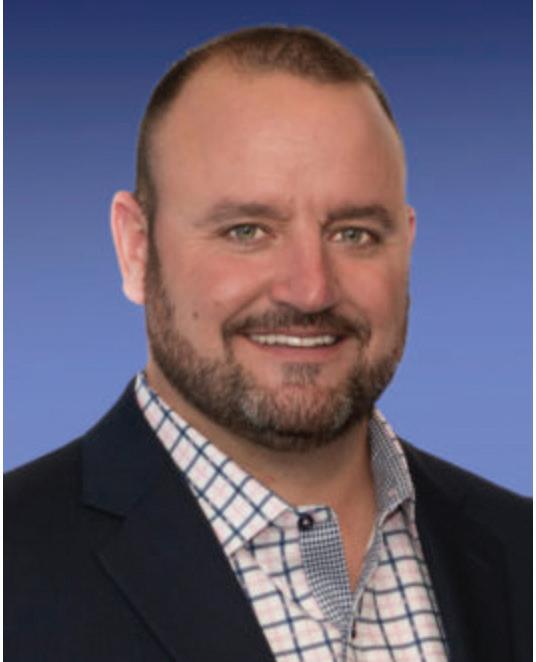
Dr. Rob Bell ’00 has released his seventh book on mental tough ness titled Puke & Rally: It’s Not About The Setback, It’s About The Comeback. Rob’s books are available on his website, www.drrobbell.com, or on Amazon.

development program in partnership with the National Park Service. Nich olas, who graduated from Shepherd with a bachelor’s degree in history, is a McMurran Scholar and a member of the Phi Kappa Phi honor society.
Robert Dugan III has written and published a book titled A Stranger Among Us: A Novel of the West Virginia Opioid Crisis, a nar rative told from the perspective of a young man living in West Virginia during the intersection of the opioid crisis and the 2008 financial collapse. This literary novel analyzes the trueto-life circumstances that lead young men to addiction. A moving novel

Nicholas Redding, executive director of Preservation Maryland, has been selected by Balti more’s The Daily Record as one of the Most Influential Marylanders for 2020. Fifty-two Most Influential Marylanders were selected by the editors for their sig nificant contributions to their respective fields and for their leadership in Mary land. The areas from which recipients are chosen include civic leadership, communications, education, finance, freestyle, general business, health care, law, philanthropy, real estate, and tech nology. Nicholas has received a spot among recipients in the civic leadership category. He has led Preservation Mary land since 2014. During his tenure, the organization has experienced dramatic growth, including launching a firstof-its-kind historic trades workforce
loaded with humor and memorable characters, A Stranger Among Us is the story of how young men in Appalachia are forever tethered to the legacy of their fathers, and it is a thought-provoking exami nation of the lasting influence of place and community on the lives of young men. It is available on Amazon in both Kindle and paperback format.
Joshua Hughes is a perma nent National Park Ranger with the National Park Service at the National Mall and Memorial Parks. Joshua staffs the Washington Mon ument, Old Post Office Tower, and Ford’s Theater National Historic Site in Washington, D.C. He gradu ated from Shepherd with a bachelor’s degree in history, concentrating in the Civil War and 19th-century Ameri ca. Joshua previously volunteered at the National Mall and Memorial Parks, Harper’s Ferry National His toric Park, Antietam National Battle field, Point Lookout State Park, and South Mountain State Battlefield, and worked as a student ambassador for the Shepherd University Office of Admissions. While at Shepherd, Joshua also co-founded and held office in the Living History Club.
 ABOVE: Donna Newman ’86 and grandson Malakai (inset), and Brad Hoffman ’00
ABOVE: Donna Newman ’86 and grandson Malakai (inset), and Brad Hoffman ’00
Virginia M. Bush ’50, of Hagerstown, Maryland, died April 9, 2020. She was born in Charles Town and was a longtime resi dent of Hagerstown. She earned her bachelor’s degree in edu cation at Shepherd. Virginia was a member of the Washington County Teachers Association and thoroughly enjoyed men toring and educating young children. She spent the majority of her career teaching first grade at Maugansville Elementary School. She is survived by her son, Lance Bush ’84 and his wife Pam, grandchildren, nieces, and nephews.
Lyman E. Burtt ’55, of Inwood, died February 25, 2020. Lyman was a math teacher at Hedgesville High School for 35 years and was employed at the Charles Town Races for 50 years. He was an elder at Hedgesville Presbyterian Church and an active member of the Hedgesville Volunteer Fire Department. Lyman enjoyed attending football, basketball, and baseball games, as well as traveling by RV and train.
Jean M. Riordon ’55, of Millsboro, Delaware, and formerly of Bal timore County, Maryland, died earlier this year. Jean received a bachelor’s degree in elementary education from Shepherd. In her professional life she taught, served as an assistant director at the YWCA, and owned and operated Fantasy Flowers, where she specialized in silk wedding arrangements. She also spon sored exchange students. She was a member of Mays Chapel United Methodist Church. Jean is survived by her husband, Robert Raymond “Ray” Riordon ’56, whom she met during their time as Shepherd students.
Frank S. Cavalier ’57, of Harpers Ferry, died May 25, 2020. Frank graduated from Harpers Ferry High School before enlisting in the Navy for four years, touring the world on the USS Salem. After his service in the Navy, he graduated from Shepherd with a degree in biology. While attending Shepherd, Frank worked for the B&O Railroad and then taught secondary education classes after graduating. After a few years, he started his main career as an educator for Harpers Ferry Job Corps for 30 years, where he taught underprivileged youth core education require ments to earn a high school diploma, as well as a trade to make them eligible for employment. Frank’s passions included read ing, woodworking, traveling, and volunteering. He was known for volunteering for the Lion’s Club, but was also a member of several fraternal orders and social clubs: Benevolent and Protec tive Order of Elks, Freemasons, American Legion, Loyal Order of the Moose, and Fraternal Order of Eagles.
Robert Wade “Bob” Maphis ’57 died May 13, 2020 in Ash land, Virginia. After graduating from Shepherd, Bob went to Vanderbilt University Divinity School. He was a military veteran and former civilian personnel officer for the federal
government. He served for many years leading congregations for the Disciples of Christ churches, including Eastwood Chris tian Church in Nashville, Tennessee; First Christian Church in Greenville, Kentucky; Valley Christian Church in Louis ville, Kentucky; and Hanover Avenue Christian Church in Richmond, Virginia. Bob also served as a hospital chaplain at Retreat Hospital. His passions were his family, friends, minis try, and VCU basketball. He was a founding member of The Final Four Club and enjoyed being a raving fan with his family for the last 43 plus years.
Barron “Barry” Ott ’57, of Manhattan Beach, California, died November 23, 2019. Barry grew up in Hagerstown, Mary land, graduating from Hagerstown High School in 1953 before receiving a bachelor’s degree in business administration from Shepherd, where he was a member of the Tau Kappa Epsilon fraternity. After graduation, Barry served in the U.S. Army from 1958-1960. Post-service he relocated to San Francisco where he started his insurance career with Royal Globe Insurance Co. and met his wife of 56 years, Barbara. During his career he was transferred to New York City and then Los Angeles, working for R.W. Thom in Beverly Hills for more than 40 years and becoming president of Insurance Brokers of Southern Califor nia before retiring. Barry and Barbara enjoyed traveling and hosting friends and family at their Maui condo.
Anita C. Tisdale Spencer ’60, of Martinsburg, died December 9, 2019. Anita taught for both Berkeley and Jefferson county schools. She was also a volunteer for City Hospital (now Berke ley Medical Center) for 37 years and was a member of Calvary United Methodist Church. She is survived by her sister Mary Ann Hamilton and brother-in-law Dr. Frank Hamilton.
Shirley Swartz ’60, of Williamsport, Maryland, and formerly of Maugansville, Maryland, died December 3, 2019. She was a member of Alpha Sigma Tau sorority. After graduating from Shepherd, she taught in Washington County, Maryland, schools for 32 years at Winter Street Elementary, Bester Elementary, Hickory Elementary, and Boonsboro Elementary. She was a member of Saint Andrew Presbyterian Church. Shirley is sur vived by her husband, Paul Swartz ’60.
Orie Thomas “Tom” Harman ’62, of Keyser, died April 22, 2020. He was a well-respected educator, coach, and administrator. Tom graduated from Keyser High School in 1958, where he lettered in football, wrestling, and track. He attended Potomac State College to gain his associate degree before completing his bachelor’s degree in education at Shepherd. He received his mas ter’s degree in education from the University of Virginia. He started his teaching career at Bruce High School in Maryland (1962-1964) where he also started the football program and had his first coaching role as assistant coach. He also worked at Valley High School in Maryland from 1964-1982 where he
started the football program and served as head coach. He had a Maryland State Championship in 1974. He also taught at the Allegany County Career Center in Maryland from 1982-1991. Tom’s administrative skills took him to Braddock Middle School in Maryland as assistant prin cipal in 1991-1992 and he also served in that role at the Career Center from 1992-1994. He was named an Out standing Young Man of America in 1992. He retired in 2002 after a 40-year career as teacher, coach, and admin istrator. Tom was an active member of the Keyser Kiwanis Club and served as a ruling elder at Keyser Presbyterian Church where he played a key role in the campaign to build a multipurpose building and saw the project through to completion. He and his wife of 57 years, Vicki, were avid WVU sports fans.
Duane Russell Peterson ’63, of Martinsburg, died March 26, 2020. Duane served as a sergeant in the U.S. Army in occu pied Italy during World War II before completing his bach elor’s degree in mathematics at Shepherd. He then received his M.Ed. from the University of Georgia. Duane worked several jobs, including the U.S. Postal Service, Fairchild, and as a schoolteacher before retiring from the Internal Revenue Service after a 26-year career.
BoAnn Bohman ’67, of Fairfield, Pennsylvania, died October 6, 2019. She received her bachelor’s degree in elementary education from Shepherd and received a master’s in the same field in 1971 from Shippensburg University. In 1985 she became an administrative intern chosen by the Maryland State Department of Education and served as a consultant. She also completed her doctorate from the University of Maryland in education, policy, planning, and administration in 1988. BoAnn spent the first part of her career with the Washington County, Maryland, Board of Education as a teacher and administrator. She also began a long tenure with Western Maryland College at this time, before transitioning to Carroll County as the principal of Mt. Airy Elementary School. After a long career in school leadership, she joined the Educational Administration Program at Western Maryland College (now McDaniel College), where she was in a tenure track position as coordinator of science programs in education administration for 26 years. BoAnn had a love for traveling. She is survived by her husband, James Murray ’67.
Don C. Pontius ’67, of Midlothian, Virginia, died May 11, 2020. He graduated from Richard Montgomery High School in Rockville, Maryland, received his bachelor’s degree in business administration from Shepherd, and earned his M.B.A. from West Virginia University. Don worked for the IBM Corporation and later in life went into the insurance business. He was a member of St. Edward
the Confessor Catholic Church and a member of the Knights of Columbus. His three children and seven grandchildren were his greatest joy in life. He is survived by his wife of 50 years, Linda Pontius ’71.
Vincent E. Martina ’69, of Easton, Maryland, died February 18, 2020. Vince received his bachelor’s degree in economics from Shepherd. He worked for 31 years as a claims superintendent for State Farm Insur ance. Vince also coached baseball and softball and was the “CFO” of the Geezers Golf Club in Ocean Pines for many years. He was a devout Catholic and attended St. Francis de Sales Catholic Church in Salisbury and St. John Neumann Catholic Church in Berlin.
Frank Aliveto ’71, of Shepherdstown, died February 11, 2020. At Shep herd, Frank played football and received his bachelor’s degree in physical education. He then received his master’s degree in educa tion administration from West Virginia University. Frank began his coaching and teaching career in Berryville, Virginia, before moving to Hedgesville High School, where he taught and coached foot ball. He later became principal at Hedgesville before being named assistant superintendent of schools for the Berkeley County Board of Education. He is survived by his wife Susan Johnston Aliveto ’70, daughter Cari Aliveto Rosen ’97, and son Frank, along with grandchil dren, sister, and brother John Aliveto ’71.
William S. “Bill” Shultz ’72, of Charles Town, died April 8, 2020. He served his country in the U.S. Army as a 1st air RTO (radiotele phone operator) during Vietnam. Bill received his Bachelor of Sci ence degree in accounting from Shepherd and had a 45-year career as a real estate broker, having owned and operated Shultz Realty in Jefferson County. He attended Charles Town Presbyterian Church, was past president of the Jefferson County Cotillion Club, and a member of the Jefferson County Kiwanis Club. Bill was an avid out doorsman and enjoyed hunting and fishing with his sons. He was also a talented woodworker and specialized in hand-hewn bowls. He is survived by his wife of 53 years, Lana Marcus Shultz ’76, three sons and their wives, and six grandchildren.
Beatrice I. Burger Mason ’77, of Dacula, Georgia, died January 7, 2020. Beatrice, a native West Virginian, received a teaching degree from Shepherd and then taught at South Jefferson Elementary School.
Jennifer Ashton Butler ’87, of Martinsburg, died April 14, 2020. She graduated from Martinsburg High School in 1981 before obtain ing her bachelor’s degree in physical education from Shepherd. She loved teaching aerobic classes and encouraging her students to live healthy lives. Jenny taught at many different schools in the area and found her home for several years at Hedgesville Elementary School. She is survived by her husband, George, and their children and grandchildren.
K. Scott Allen ’92, of Hagerstown, Maryland, died January 10, 2020. (continued
When the class of 2024 arrived on campus in late August, one student had a special connection to Shepherd that dates to the 1880s. Clay Michael Lowe ’24, of Shepherdstown, son of Philip Andrew Lowe and Laura Lowe, is the fifth generation of his family to attend Shepherd.
Clay is the grandson of Elizabeth “Betty” Snyder Lowe ’52 and is the first of her 16 grandchildren to attend her alma mater.
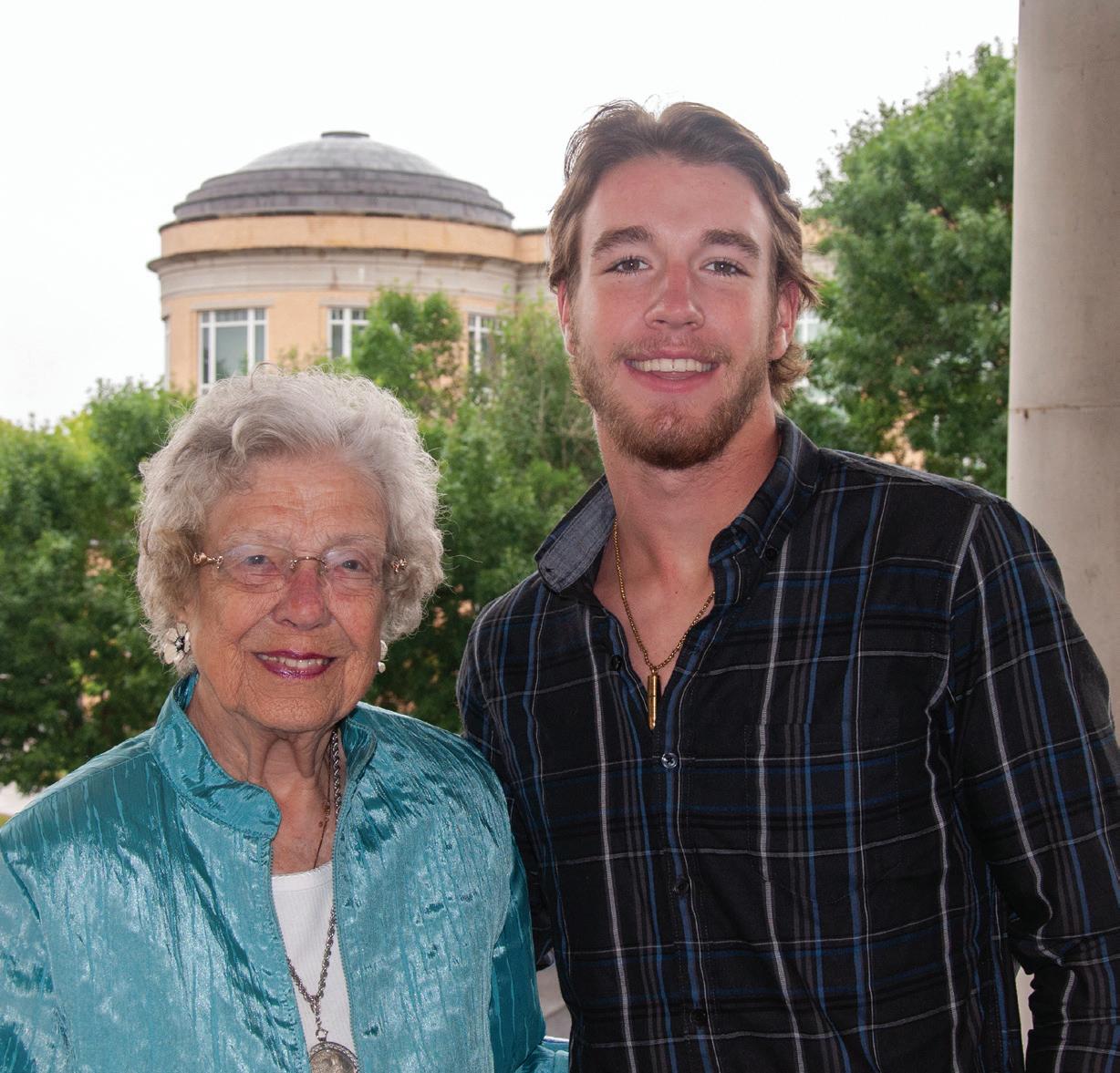
“I’m so proud,” Betty said. “My roots are here. All my life I’ve been here. I didn’t push any of them. He just volunteered and said ‘I’m going to Shepherd.’”
Clay, who graduated from Jefferson High School, is major ing in business management.
“I hope to take over the family business, Potomac Farms Nursery and Lowe Products, and make them proud too,” he said.
Clay’s 140-year-long connection to Shepherd includes great, great grandfather Daniel Henry Folk, who graduated in 1880; great grandmother Sarah Folk Snyder, who graduated in 1913; grandmother Elizabeth Snyder Lowe ’53; grandfather John Douglas Lowe Jr. ’53; and uncles John Douglas Lowe III ’79 and Scott McGarry Lowe ’81. ¾
(continued from page 13)
He graduated from Shepherd with a degree in computer pro gramming/IT systems. He was the chief information officer of Medisolv in Columbia, Maryland, author for Pluralsight, and speaker at international IT conferences worldwide. He was also a Microsoft MVP regional manager. Scott was a member of Beaver Creek Country Club.
Scott Patrick Murray ’03, of Frederick, Maryland, died April 5, 2020. Scott was born in Buckhannon, graduated from Buck hannon-Upshur High School, and received his bachelor’s degree in political science from Shepherd. He was a member of the Lambda Chi fraternity. Professionally, he worked several years for Shepherd-Pratt in Frederick. He had a great knowledge of history and always enjoyed a good discussion on many topics, especially politics. He loved animals, reading, bike riding, and investing in the stock market.
Susan E. Hood ’07, of Martinsburg, died March 14, 2020. She was a supervisor for the Loudoun County, Virginia, Youth Center. She also enjoyed being a river guide at Blue Ridge Out fitters and hosting tours for the U.S. Park Service. Susan gradu ated from Shepherd with a bachelor’s degree in recreation and sports studies.
Elizabeth Dawn “Beth” Lazear ’09, died January 23, 2020. She graduated from Shepherd with honors with a Bachelor of Social Work degree. Beth’s entire professional social work career was with Covenant House in Charleston, where she spent more than 10 years helping some of West Virginia’s most vulnerable resi dents find housing, healthcare, and hope. She is survived by her sister Melissa Lazear ’04, mother, nephew, aunt, uncle, cousins, and her partner Joe Loper. ¾
Dana Salas Norris ’08, and husband, Drew, welcomed a daughter, Aria Hope, on December 27, 2019. She joins big brothers Wade, Colt, and Dean.
Bethany Knight Clark ’13 and Denny Clark ’12 welcomed a son, Olan Alex ander, in August 2018. ¾
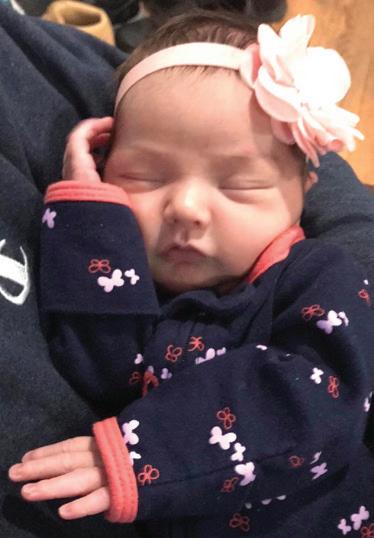 Aria Hope Norris
ABOVE: Elizabeth “Betty” Snyder Lowe ’52 is pictured with her grandson Clay Michael Lowe ’24, who represents the fifth generation of Betty’s family to attend Shepherd.
Aria Hope Norris
ABOVE: Elizabeth “Betty” Snyder Lowe ’52 is pictured with her grandson Clay Michael Lowe ’24, who represents the fifth generation of Betty’s family to attend Shepherd.
ABOVE: Kelly Pannill ’05, former academic advisor and associate direc tor of admissions at Shepherd, married Charlie Perkins on November 23, 2019, at the Old Opera House in Charles Town. They held their reception at the Hollywood Casino at Charles Town Races.
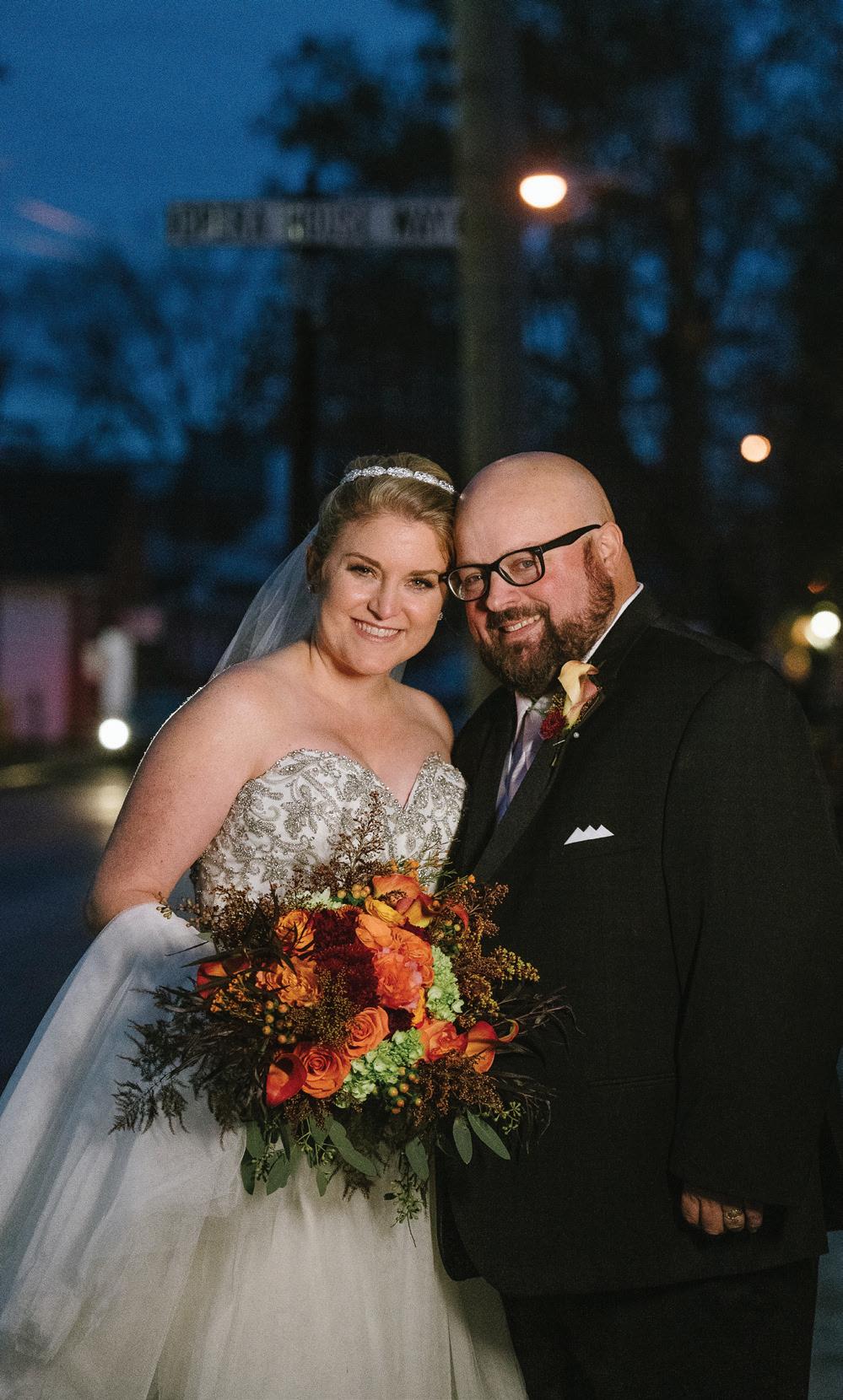
RIGHT: Many Shepherd alumni, faculty, and staff attended the Pannill-Perkins wedding. Pictured in the group photo are (front row, l. to r.) Amanda Shank Bowers ’07, Emily Gross, Kelly Pannill-Perkins ’05, Charlie Perkins, Kelly Bittner Crissman ’02, Jill Lowman Lineberry ’98, and Dawn Pitzer ’99; second row, Katie Wilson ’15, Christina Smith, Shannon Zimmerman, Dr. Heidi Hanrahan, and Taylor Perkins ’19; third row, Patrick Wallace, Lewis Harden ’93, Chris Pitzer ’97, Larry Line berry ’99, Dr. Amy DeWitt ’15 M.A., Mary Wizbicki ’95, and Cheryl Middleton ’02. Also, in attendance but not pictured were Dr. Rob Tudor and Dr. Bobb Robinson.
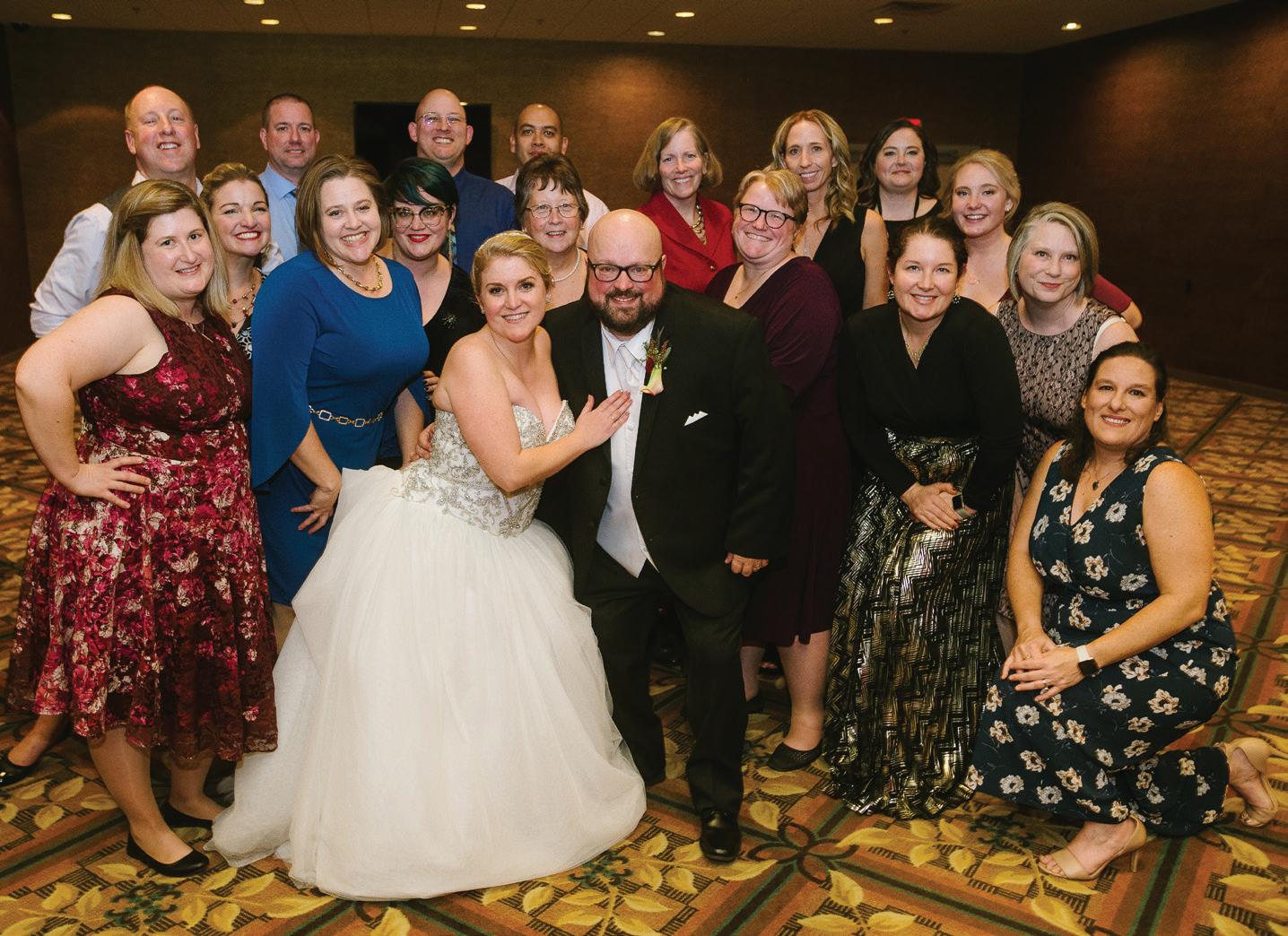
ABOVE: Caroline Cusack ’13 and Michael Johnson ’13 were married August 24, 2019, at the Tidewater Inn in Easton, Maryland. Caroline was a member of Alpha Sigma Tau, and Michael was a member of Tau Kappa Epsilon at Shepherd. Pictured are the newlyweds with Caroline’s parents, Mike ’82 and Barbara Slade ’84 Cusack.
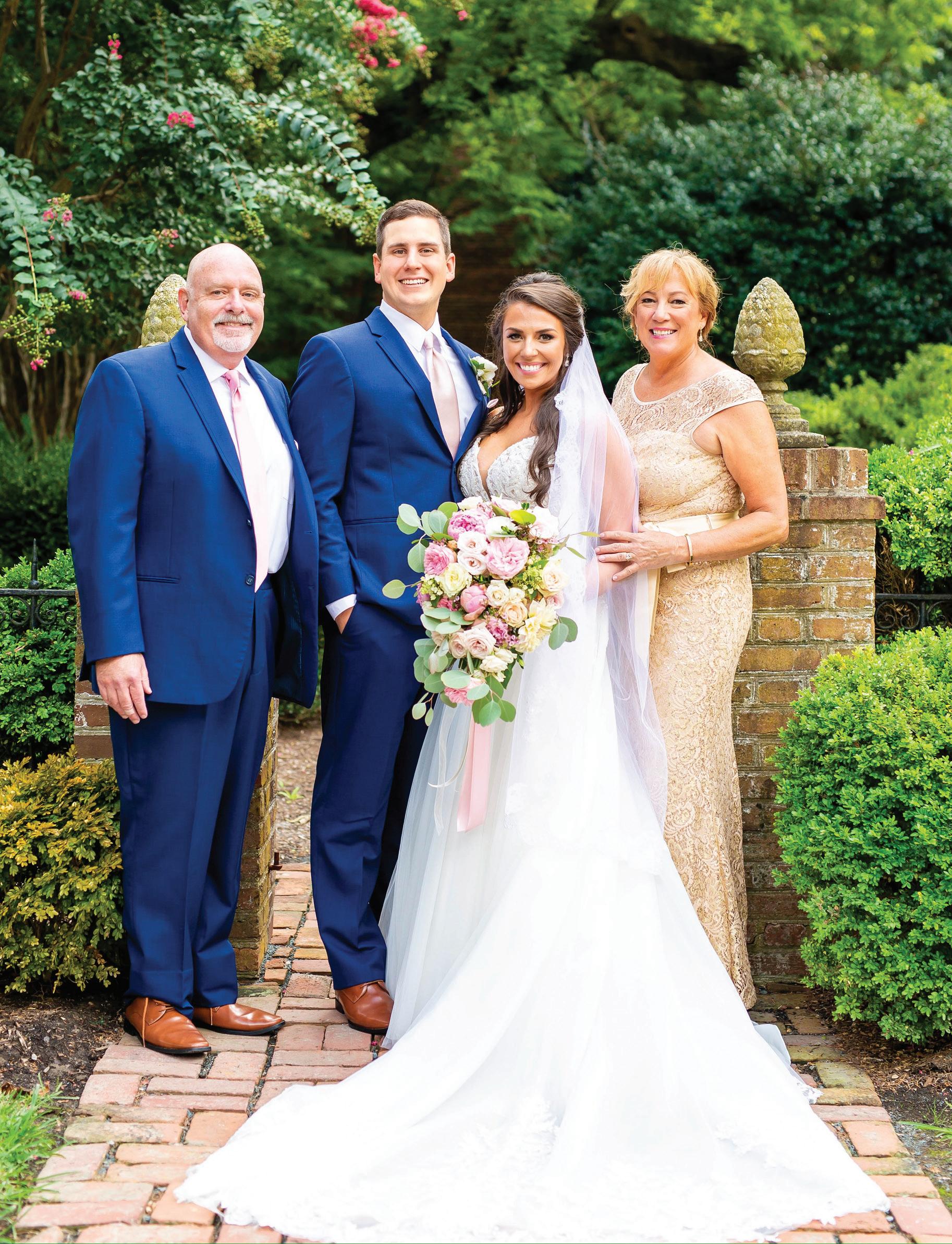
Katie Swayne Gordon ’12 has been named director of alumni affairs. She is excited to be at the helm of the alumni office for her alma mater.
Katie, who earned a Bachelor of Sci ence degree in business administration, previously served as Shepherd’s alumni and annual giving coordinator, work ing on numerous alumni events and programs, as well as with the Alumni Association board of directors. Prior to joining the staff at Shepherd, she worked for the West Virginia Depart ment of Health and Human Resources in the Hampshire County office.
“I’ve been in the Office of Alumni Affairs five and a half years now, so it’s something I’ve been working toward,” Katie said. “I’m excited. I have a list of ideas. I’ve been working with the board members for a few years, so they know me well. I feel like we will work well together and can get some new things implemented. There are exciting things to come.”
Katie believes the fact that she’s an alumna will help her succeed in her new position.
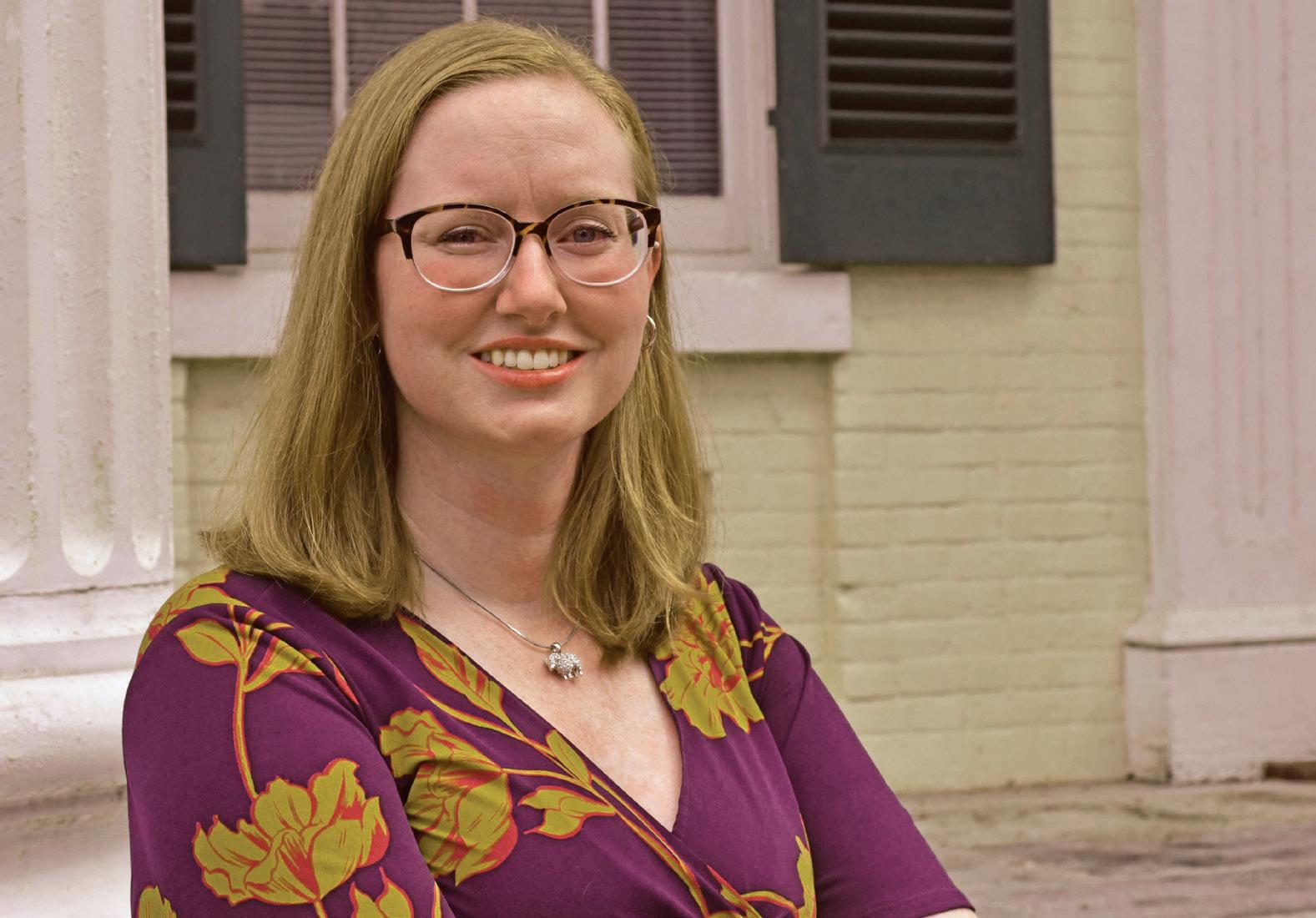
“I have prior knowledge of a dif ferent side of the university,” she said. “I’m not just seeing the business side; I’m seeing it from the students’ perspec tive as well, and being a younger alum graduating in 2012, there’s not a huge gap so I feel like a lot of things that I experienced during my time here is still the same for current students.”
Katie, who grew up in Keyser, trans ferred to Shepherd after spending two years at Potomac State College.
“When I came here, I really felt like I had found where I needed to be and
it’s definitely where I wanted to be,” she said. “Coming back here for a job and now being named director, I think is just perfect for my life. It’s not a career path I thought I’d ever take, but it’s definitely one that fits well and I’m really enjoying it.”
She said all the jobs she’s had have been customer service oriented, and she feels running the Office of Alumni Affairs is an extension of that experience. She also enjoys planning events for alumni.
“It’s the best part of the job,” she said. “I enjoy getting to see people come back and tell their stories and hearing the crazy stories of the older alums, like those from the ’60s and ’70s. They just want to tell you all about how Shepherd was back in the day and compare notes on how it is now and what’s changed. You get a lot more history in this job than you would think. That’s the fun part of it.”
Creating more opportunities for
younger alumni, specifically for net working between alumni and students, is one of her goals.
“We don’t have a whole lot of stu dent interaction currently, so I’d like to bring them into the fold, let them know what we’re about, so when they grad uate, they aren’t just scratching their head wondering what the Alumni Asso ciation does,” she said. “They’ll know ahead of time and be more excited about participating.”
Popular alumni activities will con tinue, according to Katie, as will the newly created travel program, which is planning a second trip to Portugal in 2021.
“I really want to ramp up that program and offer more trips in the future—maybe several a year,” she said. “It offers the opportunity for alumni to travel and see the world with fellow alums and friends of the university.”
¾ Cecelia MasonShepherd has active regional alumni groups in the Eastern Shore/Delaware and South west Florida areas with more groups forming. Reach out to the ambassador nearest you to join or become an ambassador in your area. Visit www.shepherd.edu/suaa/regionalcommunities for more information and photo galleries or contact Katie Gordon, director of alumni affairs, at 304-876-5524 or kswayne@shepherd.edu
Katie Swayne Gordon ’12Sue Menzter-Blair ’72 has been named the 2020-2021 Outstanding Alumna of the Year.
The new class of Finest Under 40 alumni recipients includes Mary Beth Group ’03, Tiffany Lawrence ’04, Matt Long ’07, Hannah Williams-McNamee ’11, Jessica Salfia ’12 M.A., and Kevin Pawlak ’14.
The award winners were honored October 29 at a private event for the award recipients and their guests, along with select university and alumni association staff.
Due to COVID-19, the Shepherd University Alumni Association will not hold the traditional ceremony and reception; the event was limited to 25 people to ensure social distancing. The alumni ceremony was recorded and posted on the Shepherd University Alumni Asso ciation social media pages and on YouTube channel @ShepherdAlumni. ¾
Where are our alumni and what are they working on?
Shepherd University alumni are representing their alma mater across the country. Over the last several months, the Shepherd University Alumni Association has been featuring alums from different regions, already cover ing the West Coast and Mountain regions, in its social media series Rams Across America. You can check out alumni profiles already posted on the SUAA Facebook, Twitter, or Instagram pages @ShepherdAlumni
If you would like to be featured for your region, contact Katie Gordon, director of alumni affairs, at kswayne@shepherd.edu. ¾
The Alumni Association is accepting nominations for the 2021-2022 Outstanding Alumnus/a of the Year and the next class of Finest Under 40. Each year, nomina tions for these awards are voted on by the Shepherd University Alumni Association Board of Directors at its annual June meeting. The new recipients will be honored during Homecoming 2021.
Criteria and nomination forms can be found at www.shepherd.edu/suaa/alumni-recognition-programs. The nomination deadline is June 1, 2021. ¾
The Shepherd University Alumni Association’s next trip is fast approaching, so book your spot now!
Departure date: June 1, 2021
Roaming Rams Alumni Travel Program: Info Box Use same box design from Spring 2019 issue—substitute below text. Join us as we continue our travels. Our next trip is fast approaching, so book your spot NOW!
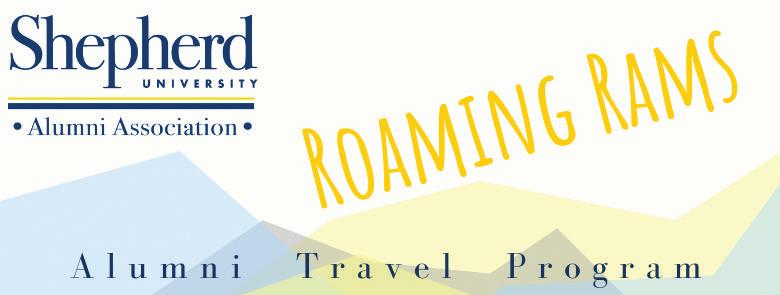
10-day trip featuring the Estoril Coast, Alentejo, and Algarve, plus many other stops along the way.
• 12 meals included throughout your journey.
Departure date: JUNE 1, 2021 10-day trip featuring the Estoril Coast, Alentejo, and Algarve, plus many other stops along the way. 12 meals included throughout your journey. Total all-inclusive price* (double occupancy**) $4,149 Book by December 1, 2020 for an early booking bonus discount of $250!
• $4,149 total all-inclusive price* (double occupancy**).
*All-inclusive refers to pricing that includes land travel and air fare fees, and taxes.
• Book by December 1, 2020, for an early booking bonus discount of $250!
*All-inclusive refers to pricing that includes land travel and air fare fees, and taxes.
**Single occupancy rate is additional $800 Visit www.shepherd.edu/suaa/roaming-ramsalumni-travel-program for more details and how to sign up. You can also check out galleries from our past explorations!
**Single occupancy rate is an additional $800.
Visit www.shepherd.edu/suaa/roaming-ramsalumni-travel-program for more details and how to sign up.
You can also check out galleries from our past explorations!
The Shepherd University Athletic Hall of Fame will induct four new mem bers at the annual induc tion banquet scheduled for April 2021.
Football player Tom Korbini ’88 joins Lee Cook ’63 (men’s swimming), Ed Bridge ’95 (men’s soccer and men’s basketball), and Laura Harkins Kelly ’09 (women’s basket ball) as the 35th class to be inducted. This year’s class bring the total number of inductees in the Shepherd Athletic Hall of Fame to 159.
Korbini (Berryville, Virginia/1984 grad uate of Park View High School) was a member of the football team from 1984-87 where he started all 41 games for the Rams over that period. He was a member of the 1986 team that won the WVIAC title and gained an NAIA Playoff appearance. He was a threetime All-Conference choice who gar nered first team honors in 1985 and 1987. Korbini was an NAIA honorable mention All-American as a senior. He recorded 216 tackles (110 solos) with 26 sacks over his career. His 26 sacks currently rank him seventh on the Shep herd all-time list.
Cook (Vienna, Virginia/1959 graduate of Anacostia High School) was a fouryear standout on the Shepherd men’s swimming team from 1959-63. He led Shepherd to WVIAC titles in 1961 and 1963. Cook set numerous records over his career, which included pool, school, and conference marks. He was the team’s top point scorer in 1961, 1962, and 1963. He earned a total of seven first place finishes in three WVIAC Championship meets. Cook was also a two-year member of the men’s track team and helped Shepherd place second at the 1961 WVIAC title meet as a par
ticipant in the pole vault, long jump, and the 4x400 relay team.
Bridge (Leesburg, Virginia/1990 grad uate of Salesianum, Delaware, School) was a four-year standout goalkeeper on the men’s soccer team from 199194. Bridge was a two-time All-WVIAC choice who gained first team honors in 1994 when he posted a record eight shutouts. He finished his career as the program’s all-time leader in saves (504).
He led the team in saves for all four years, including a then-record 153 in 1992. Bridge posted a school-record 20 saves against Davis & Elkins in 1992.
He was also a four-year member of the men’s basketball team, where he devel oped into one of the team’s top threepoint threats. Bridge was a member of the 1992 WVIAC Tournament Cham pion team.
Kelly (Atlanta, Georgia/2004 graduate of Spring Grove, Pennsylvania, High School) was a four-year standout on the women’s basketball team from 2004-08. She helped lead the Rams to a 70-45 (.608) record over career, including a program-best 24-7 mark in 2007-2008 as WVIAC champions. A two-time All-WVIAC performer, she gained first team honors as a senior team captain.
Kelly ranks 10th on the all-time scor ing list with 1,225 points and eighth on the all-time rebounding chart with 730. The program’s all-time leader in blocked shots (248), she shares the sin gle-season mark (69). She was named to the 2008 East Regional All-Tourna ment Team as she led the team to the regional title game.
Banquet information will be made available as soon as the plans are final ized. ¾ Chip Ransom
The Board of Directors of the Pennsylvania State Athletic Conference voted on July 14 to suspend all conference athletic events and championships through the fall semester in response to the COVID-19 pandemic. The conference, of which Shepherd is a member, plans to shift fall sports competition and champi onships to the spring semester and fully intends to do so if a return to competi tion can be safely executed.
“Although we are very disappointed that our student-athletes will not be competing in athletic events this fall, we appreciate the thoughtful deliberations based on scientific evidence that led to this critical decision. The safety of our students, coaching staff, fans, and community is most important, and our ath letes will continue to condition and train until it is viable to return to NCAA competition,” said President Mary J.C. Hendrix ’74
“Following the difficult decision from the PSAC Board of Directors, our department is dedicated to providing a meaningful experience for our studentathletes during the 2020-2021 school year,” said Chauncey Winbush ’95 and ’00, vice president for athletics.
All fall and winter sports scheduled to begin before January 1 are impacted by this decision. PSAC will evaluate the necessary schedule changes and will communicate its plans for moving all competitions to spring at a later date. ¾
The baseball team finished the season with an 11-7 overall mark. After starting the year at 1-6, the Rams won 10 of their next 11 games to close out the season.
The offense was led by junior out fielder Daniel Keer of Lehighton, Penn sylvania, senior first baseman Dalton Stewart of Sharpsburg, Maryland, sophomore outfielder Brennan Holmes of Ona, and junior outfielder Jared Carr of Martinsburg.
Keer led the Rams with a .373 bat ting average with 19 hits in 51 at-bats. He drove in 21 runs and scored 11. He added two doubles and a pair of home runs. Keer was 6-of-7 in stolen bases.
Stewart added a .365 batting average with a team-best 23 hits in 63 at-bats. He tied Jared Carr for the team lead in runs batted in with 22 while leading the team in home runs (6) and doubles (6). Stewart also topped the team in slugging percent age (.746), on-base percentage (.500), and OPS (1.246).
Holmes batted .341 with 14 hits in 41 at-bats. He drove in six runs and scored 16. He added four doubles. Holmes was 3-of-3 in stolen bases.
Carr batted .318 with 21 hits in 66 at-bats. He tied Dalton Stewart in runs batted in (22) and paced the team with 24 runs scored. Carr added nine doubles, a triple, and three home runs. He led the team with 14 stolen bases in 17 attempts.
The pitching staff was led by senior Ryan Marketell of Web ster, New York, senior Mitchell Wilson of Hagerstown, Mary land, senior Steve Bowley of Medford, New Jersey, and senior Eric O’Brien of Richmond, Virginia.
Marketell posted a 2-0 mark with a 3.21 ERA. He fanned 15 in 14.0 innings. Wilson recorded a 2-1 record with a 4.26 ERA. He fanned 26 in 25.1 innings. Bowley posted a 2-2 mark with a 4.34 ERA. He had a team-best 28 strikeouts and led the team in innings pitched with 29.0. O’Brien posted a 0-0 mark with a 3.38 ERA. He fanned 11 in 13.1 innings.
The Rams recorded a 4-6 overall mark on the season.
The offense was led by sophomore third baseman Nicole Purtell of Cen treville, Virginia, junior second base man Leann Brown of Hume, Virginia, and junior shortstop Ashley Burger of Hedgesville.
Purtell paced the Rams with a .469 batting average with 15 hits in 32 at-
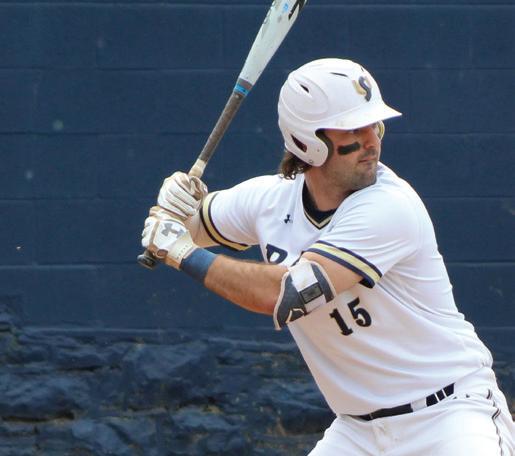
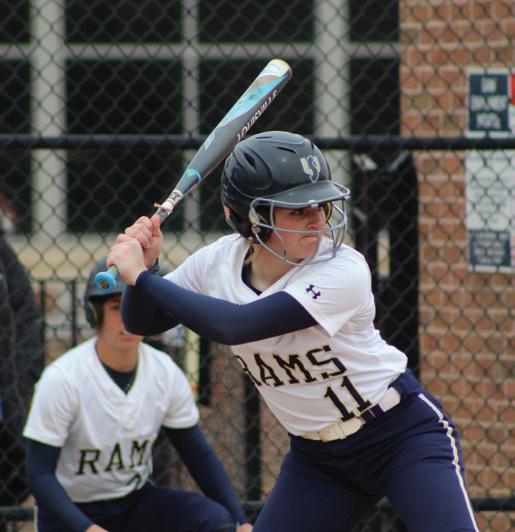
bats. She drove a team-best 10 runs and scored five. Purtell added a team-best six doubles and a home run. She topped the team in slugging percentage (.750), on-base percentage (.500), and OPS (1.250).
Brown batted .375 with 12 hits in 32 at-bats. She drove in seven runs and scored eight. She added three doubles.
Burger batted .355 with 11 hits in 31 at-bats. She drove in five runs and scored seven. She added a pair of doubles and a team-best two home runs.
Freshman pitcher Katie Laing of Jefferson, Maryland, led the pitching staff. Laing posted a 2-2 mark with a 3.27 ERA. She led the team in innings pitched (24.2), strikeouts (12), appear ances (5), and complete games.
The women’s lacrosse team posted a 3-2 overall mark with an 0-1 record in PSAC action.
The offense was led by junior attacker Sidney Kelly of Hag
erstown, Maryland, sopho more midfielder/defender Paige Alexander of Ashburn, Virginia, and senior attacker/ midfielder Jordan Sauro of Mt. Airy, Maryland.
Kelly led the team in goals (14), assists (5), and points (19). She added 13 draw con trols, seven ground balls, and one caused turnover.
Alexander had six goals and three assists for nine points. She added a team-best 14 draw controls along with 10 ground balls and five caused turnovers.
Sauro tallied six goals and two assists for eight points. She added five ground balls, four draw controls, and a caused turnover.
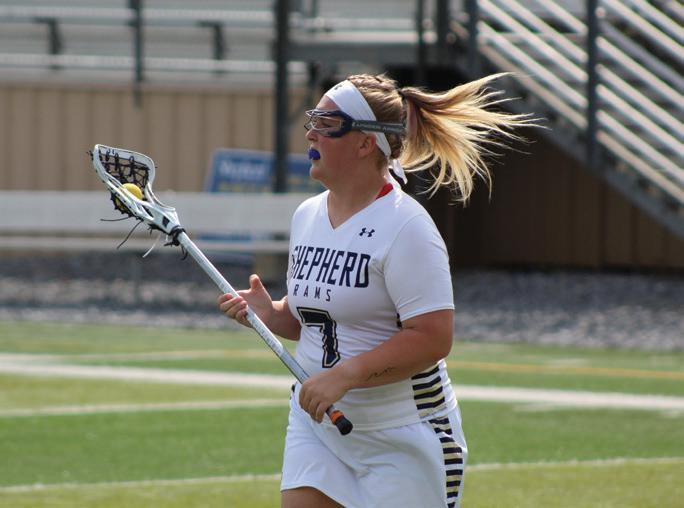
The defense was led by senior defender Lyric Feingold-Con away of Westminster, Maryland, and sophomore goalkeeper Hailey Bennett of Westminster, Maryland.
Feingold-Conaway anchored the defense with 18 ground balls, 11 draw controls, and a team-best six caused turnovers.
Bennett posted 60 saves with a .472 save percentage. She had a 13.40 goals-against average. Bennett added a team-best 25 ground balls and three caused turnovers.
The Rams posted a 1-3 mark on the season. Shepherd’s victory was a 9-0 triumph over Shenandoah.
Senior Carter Davis of Harpers Ferry led the Rams with a 3-1 mark at number one singles and a 1-3 record at number
Outfielder Daniel Keer Third baseman Nicole PurtellOwen Elliott, of Hedgesville, was named to the PSAC Men’s Golf All-Conference Team. Elliott earned second team accolades.
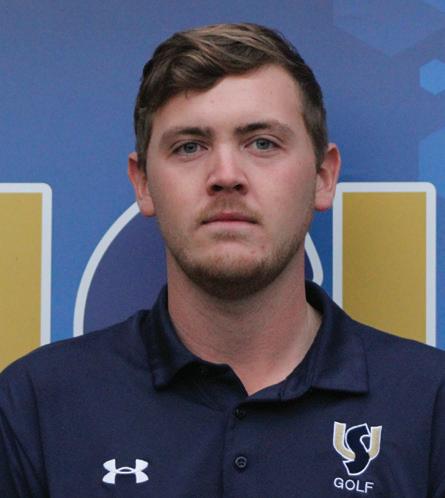
Elliott, who gained All-Conference honors for the third consecutive year, finished second at the PSAC Championships this year.
Elliott added three more top-10 finishes on the season as he tied for second at the Hal Hansen Invi tational, finished seventh at the Williams CC Colle giate, and finished ninth at the Glade Springs Invi tational. ¾
Vice President for Athletics Chauncey Winbush ’95 and ’00 recently announced that Shepherd will be adding men’s and women’s cross country along with women’s golf as varsity sports for 2020-2021.
Shepherd has not competed in cross country since 2003, while the women’s golf team will begin its inaugural season. The addition of these three sports increases the total number of varsity sports at Shepherd to 15. ¾
The Shepherd volleyball team has been honored by the United States Marine Corps (USMC) and the American Volleyball Coaches Association (AVCA) as one of a record 1,313 teams to have earned the USMC/AVCA Team Academic Award for the 20192020 season.
The award, initiated in the 1992-1993 academic year, honors volleyball teams that maintain a year-long grade-point average of 3.30 on a 4.0 scale or 4.10 on a 5.0 scale. ¾
The Intercollegiate Tennis Association (ITA) announced that the Shepherd University women’s tennis team was selected as a 2020 ITA All-Academic Team.
For a team to be selected as an ITA All-Academic Team, the program must have a team grade point average of at least 3.20 for the current academic year.
The Shepherd women posted a 2-3 mark for the 2019-20 season. The Rams boasted a 3.322 team grade point average. ¾
one doubles. Davis was also named a 2020 Intercollegiate Tennis Association (ITA) Scholar-Athlete.
Shepherd recorded a 2-3 overall mark on the season. The Rams picked up wins over California (Pennsylvania) and Shenandoah.
Freshman Morgan Burner of Winchester, Virginia, paced the Rams with a 3-2 mark in singles play and a 3-2 record in doubles action. Burner was also named a 2020 Intercollegiate Tennis Association (ITA) Scholar-Athlete. ¾ Chip Ransom
Due to the ongoing COVID-19 pan demic, the Shepherd University Foundation made the difficult decision to cancel the 19th annual Scarborough Society Gala originally slated for August 7. A marquee fundraising event for the Foundation, the gala raises significant funding each year for the Scarborough Library.
Despite the unfortunate cancellation of the summer event, the Scarborough Society, under the leadership of board president Ray Alvarez ’62, felt it crucial to continue its mission of providing new sources of supplemental funding for the Shepherd University library system. The Foundation is proud to recognize the gala’s corporate partners who have chosen to make a donation to benefit the Scarborough Library in lieu of their tra ditional sponsorships. These generous gifts will help maintain and strengthen the library as an interactive and modern hybrid of printed and online resources. We wish to extend a heartfelt thank you to the following corporate partners for their gifts:
Presenting Level $5,000+
BB&T Wealth Management Jefferson Security Bank United Bank Inc. Wealthspire Advisors
Benefactor Level $1,000+ Jerry Williams, State Farm Insurance
Patron Level $500+
Bowles Rice McDavid Graff and Love LLP McMorgan and Co.
Ours Lawyer Lewis & Company PLLC
PriceRomine PLLC River Riders
Skinner Law Firm
Smith Elliott Kearns and Co. LLC
In happier news, planning is already underway for the 2021 gala—visit shepherduniversityfoundation.org for more details! ¾
Elliott named to PSAC Men’s Golf All-Conference TeamLike many events last spring, the fourth annual Musical Showcase for Scholarships, originally sched uled for April 4, was canceled due to COVID-19 precautions. The evening promised a wonderful program high lighting the exceptional faculty, stu dents, and alumni of the Shepherd Uni versity School of Music.
Despite this setback, the Founda tion is grateful to our hosts and spon sors who made our fundraising efforts a success. Their gifts helped the School of Music raise more than $35,000 for student recruitment and retention. To these generous donors we extend our most sincere gratitude.
Marellen Johnson Aherne Marianne and Duane Alexander Anonymous
Marcia Brand and Mark Outhier
Gat and Susan Caperton
Alan Gibson and Scott Beard Mary J.C. Hendrix and Chuck Craft Jantina and Kenneth Mann
Susan Mills
Susie and GT Schramm
Jeff Stead and Ted Walton Younis Orthodontics
Sponsors
Impresario $10,000+ Beth K. Batdorf and John S. Bresland
Virtuoso $2,500+ Liz and Chris Giese Susan Kemnitzer
Composer $1,500+ BB&T
Anne and Roger Munro Victoria Weagly and Polly Kuhns
Concertmaster $500+ Judith and Marc Briod Jack and Pat Egle
Pete Hoffman and Steve O’Toole John Pullen
Roy Winkel
Additionally, the Foundation extends a special thank you to event co-chairs Marcia Brand and Lisa Younis. ¾
A new season of the Scarborough Society Art and Lecture Series will feature at least two virtual events in compliance with Shepherd’s COVID-19 guidelines. Addi tional details and login information may be found under Upcoming Events at shepherd universityfoundation.org. All events are free and open to the public and, in the case of the virtual events, may be enjoyed from the comfort of your own home.
Thursday, October 22, 7 p.m.—Storyteller and musician Adam Booth will offer a virtual presentation on the art of storytelling. The event will take place via Zoom. Tuesday, December 15, 7 p.m.—Dr. Heidi Hanrahan, English and Modern Languages professor and 2018 West Virginia Professor of the Year, will offer a virtual discussion of Charles Dickens’ classic novella A Christmas Carol. The event will take place via Zoom. Thursday, April 8, 2021, 7 p.m.—Evan Boggess, director of the Phaze II Gallery, will give a presentation on the methods used in creating process-oriented art. This presen tation is planned as an in-person event in the Scarborough Library Reading Room; however, details are subject to change. ¾
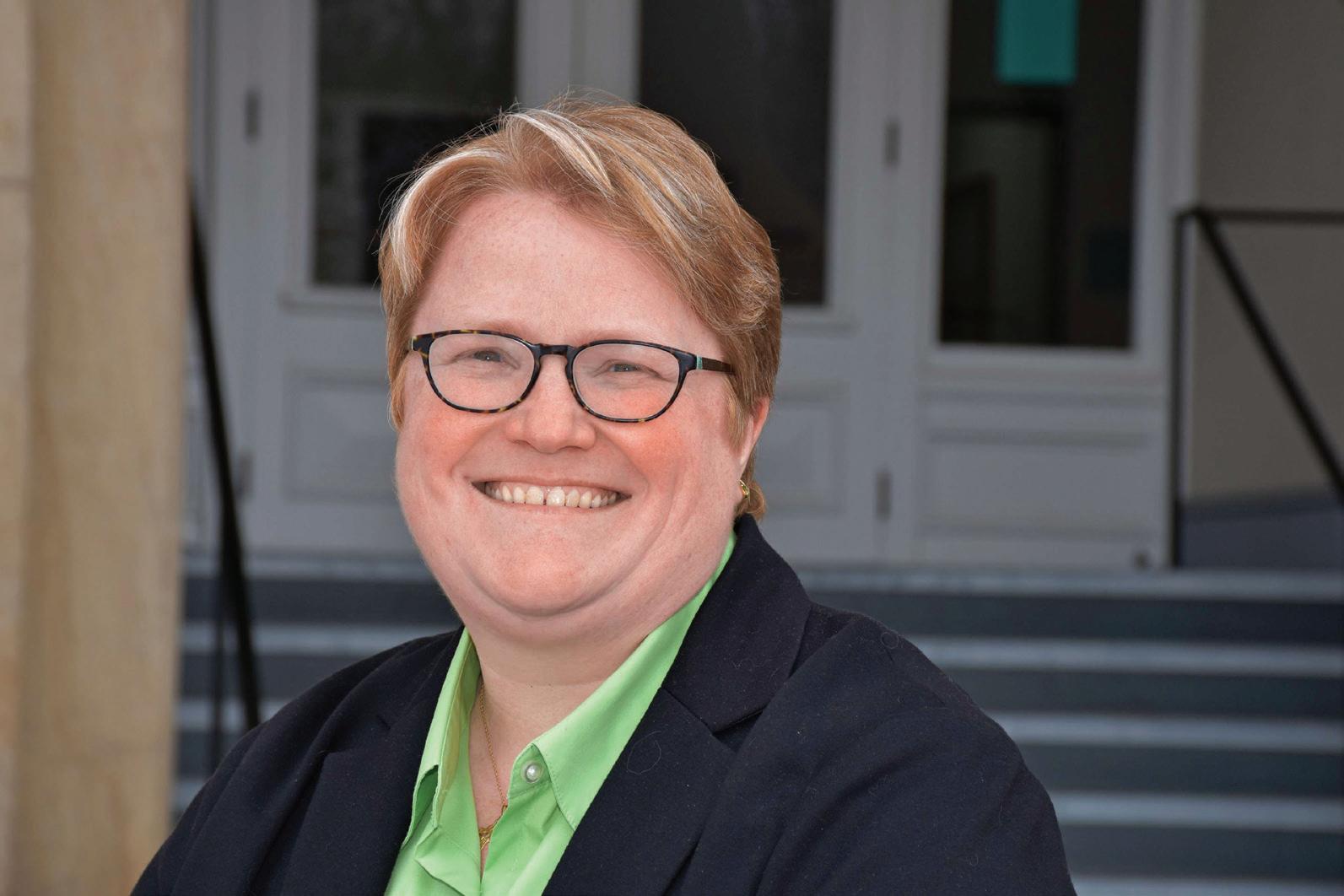
OnWednesday, November 18, at 7 p.m., Anthony Hess of Flowers Unlimited Designs and Boutique in Martinsburg will lend his expertise via an online Zoom demonstration on how to create the perfect holiday floral arrangement. Participants will have the option of ordering supplies from Flowers Unlimited beforehand to create their own masterpieces at home, or they may simply enjoy the demonstration as a viewer. The estimated cost of supplies is $60. Details for the Zoom platform will be provided upon registration. Guests are encouraged to register by Tuesday, November 17, to allow for supply pick-up or delivery.
On Saturday, April 17, 2021, Women for Shepherd will host a tour of Trego Moun tain Nature Center, in Keedysville, Maryland. Located on the property of Dina Spano manolis, the wildlife sanctuary is home to many species of animals, including several birds of prey. A master falconer, Spanomanolis will give a presentation featuring sev eral of her raptors. The event will begin at 2 p.m., with a rain date of Saturday, May 15, 2021. Tickets are $10 and may be reserved through Friday, April 16, 2021.
Reservations for these events may be made with Meg Peterson, director of donor relations, at 304-876-5021 or mpeterso@shepherd.edu. ¾
ABOVE: Dr. Heidi Hanrahan will lead a virtual discussion of “A Christmas Carol” December 15.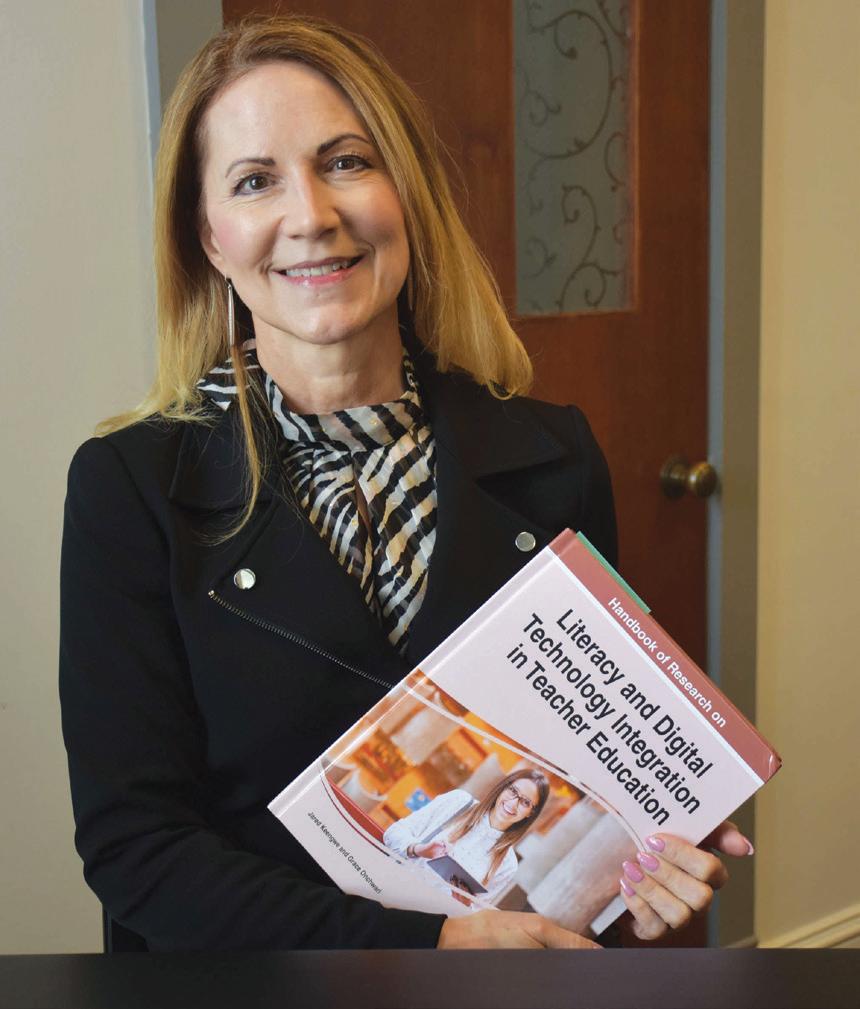
In January 2020, the emer gence of COVID-19 dra matically impacted every day life for billions of people globally. A notable area affected was education, which forced more than 90 percent of students worldwide out of the typical classroom setting and into a virtual landscape. As teachers everywhere strug gled to adapt to a new teaching model, the Shepherd University School of Education used this pandemic as an opportunity to forge into a new future.
In an uncertain and unprecedented time, the importance of relation ships and sense of purpose are preva lent now more than ever. The School of Education, under the leadership of Dr. Jennifer Penland, takes to heart both of those concepts. Two years ago, Pen land introduced the goal of gradually introducing a more online approach to field observations and coursework. Fast forward to early spring 2020—
the COVID-19 pandemic forced the school to move its entire program online during a 10-day extended spring break. Through the guidance of Shepherd’s IT department, the Center for Teach ing and Learning, and a few seasoned faculty members, Penland’s forward thinking allowed for a transition that was, if not exactly painless, much more successful than could have been hoped.
“Not to say there weren’t significant stresses and challenges during that tran sition, because there were,” said Pen land, who noted that constant vigilance and clear communication to all involved parties were key in salvaging the semes ter. “Regardless, to meet the needs of our students, we had to create a new learning mindset. And incredibly, class participation, coursework completion, and results from required testing such as the education Teacher Performance Assessment (edTPA) were extremely successful. Our students and faculty really rose to the challenge.”
One of the key components of the vir tual learning transition was the rework ing of the student teacher field com ponent. The hands-on application of knowledge through student teaching is paramount in an educator’s journey, so meeting those requirements while oper ating within the pandemic was tricky.
Relationships with partner schools and the West Virginia Public Education Collaborative (WVPEC) proved to be vital. All lesson planning, instruction, and final evaluations were done online via Zoom, a video conferencing appli cation that has gained massive popular
ity during COVID-19. Student teachers, through safe social distancing practices, could either go into the supervising teacher’s classroom to conduct lessons together, or they could link in remotely from home. The virtual platform yielded surprising benefits.
“Because these portals could be accessed by the supervising teacher, student teacher, and faculty advisor on campus, everything could be observed in real synchronistic time,” said Penland, who pointed out that comments and feedback from the cooperating teacher, as well as the student’s self-evaluation reflection, were still an asynchronistic component of the process. “This was all done through guidance from legal counsel and the state, allowing the stu dents to choose which way they felt most comfortable.”
Heading into next year, these vir tual classrooms are likely to be a part of the larger discussion on the continu ing navigation of pandemic-era learn ing. Requirements such as standards and measurements of PPE and protocols for campus visits will all be addressed by school districts and state governance boards.
“I’ve asked about the requirements for facial coverings, and who will be responsible for providing them in the classroom,” said Penland, cautioning that not all new teachers may be able to afford that cost. “Will there be options for virtual teaching hours as there was this past spring? These are things that, even with technology in place, need to be discussed in case we see a sudden switch from in-person to online happen once again.”
LEFT: Dr. Jennifer Penland is paving the way forward in adapting a hybrid of in-person and online teaching methods. Penland co-wrote the chapter “Perceptions of New Realities for the 21st Century Learner” with Dr. Kennard Laviers, assistant professor of computer science at Sul Ross State University in Texas, for the newly released Handbook of Research on Literacy and Digital Technology Integration in Teacher Education with IGI Global. The chapter explores the use of virtual and mixed realities in the classroom.These changes to the typical structure of the School of Education’s course work and student teaching field compo nent may seem like a sudden outcome forced by the pandemic. In reality, they merely reflect an accelerated timeline of embracing a more technological-heavy learning environment. Before COVID19, the education technology business was already nearing $19 billion glob ally; now, it is projected to reach $350 billion over the next five years.
“The School of Education has really been at the forefront of the state with piloting any kind of new initiative,” said Dr. Scott Beard, provost and vice president for academic affairs. “They have really been working very hard to have the best academic experience that combines in-person learning with the advantage of technological tools, which in the long run can be more efficient and cost-effective.”
Following up a 2019 EdTech appeal, sent to the education alumni to raise much-needed funding for classroom technology upgrades, the school began the 2020-2021 academic year with the inclusion of iRubric. This online assess ment tool, housed within Shepherd’s learning management system, aids fac ulty in developing and sharing course rubrics with their students and cooper ating teachers.
However, riding this wave runs even deeper; a proposal to create a Student Collaborative Space within Knutti Hall will prepare student teachers for field experiences that now integrate emer gent technologies requested by regional school partners. In addition to standard upgrades like smart TVs, recording devices, computers, and iPads, the plan also provides for more unique projects like Swivl, a robotic mount that uses tracking, line of sight technology, and a 360 degree rotating platform for video recording useful in lesson planning, selfreflection, and presentations.
The most forward-thinking and out rageous item on the wish list is the inclu
sion of a video wall green screen that would allow several people to work on different projects simultaneously while streaming to outside sources. Not only would this require infrastructure improvements, but the hefty $15,000 cost has elicited sticker shock for many.
“Some faculty questioned why we would even need such a thing,” said Penland, who is adamant that the new collaborative space is vital for support ing scaffolding information while cus tomizing and personalizing learning for teacher candidates. “I said ‘Well, we don’t need it—THEY (the students) do.’ Once we are able to reach that next level, we will see an uptick in gradua tion rates, testing scores, and proficiency exams. We are creating the teachers that go into the field, and if we create awe some teachers, then we will positively influence our public schools.”
Is the future of teaching in the physical classroom?
While COVID-19 is still proving to be a hurdle for all facets of life, it provides the School of Education an opportunity to emerge as a leader in a climate where educator preparation continues to face increasing scrutiny.
“The pandemic has helped many parents realize the value of educators,” said Provost Beard, who added that all the technology upgrades in the world are rendered ineffective if students, both at Shepherd and in public school class rooms, are unable to access the tools and/or connectivity. “It has allowed us to see what needs to be addressed systemically and address the question ‘How can we be a catalyst of change?’”
Ultimately, a blended approach to inperson and online teaching is the direc tion education is headed. Shepherd’s School of Education is dedicated to the
creation of new ideas and adopting new ways of thinking in order to meet that direction head-on.
“With the continuation of the online pedagogy, we’re going to lose the stu dents who don’t have that face-to-face connection unless we find a way to bridge it. A teacher does touch each stu dent’s life—and that’s part of the affec tive, social-emotional side of teaching,” said Penland. “However, this will be our new norm. We cannot go back to strictly bricks and mortar. We are on the preci pice, and it’s how we respond that will make a difference for our students, and consequently, their students.”
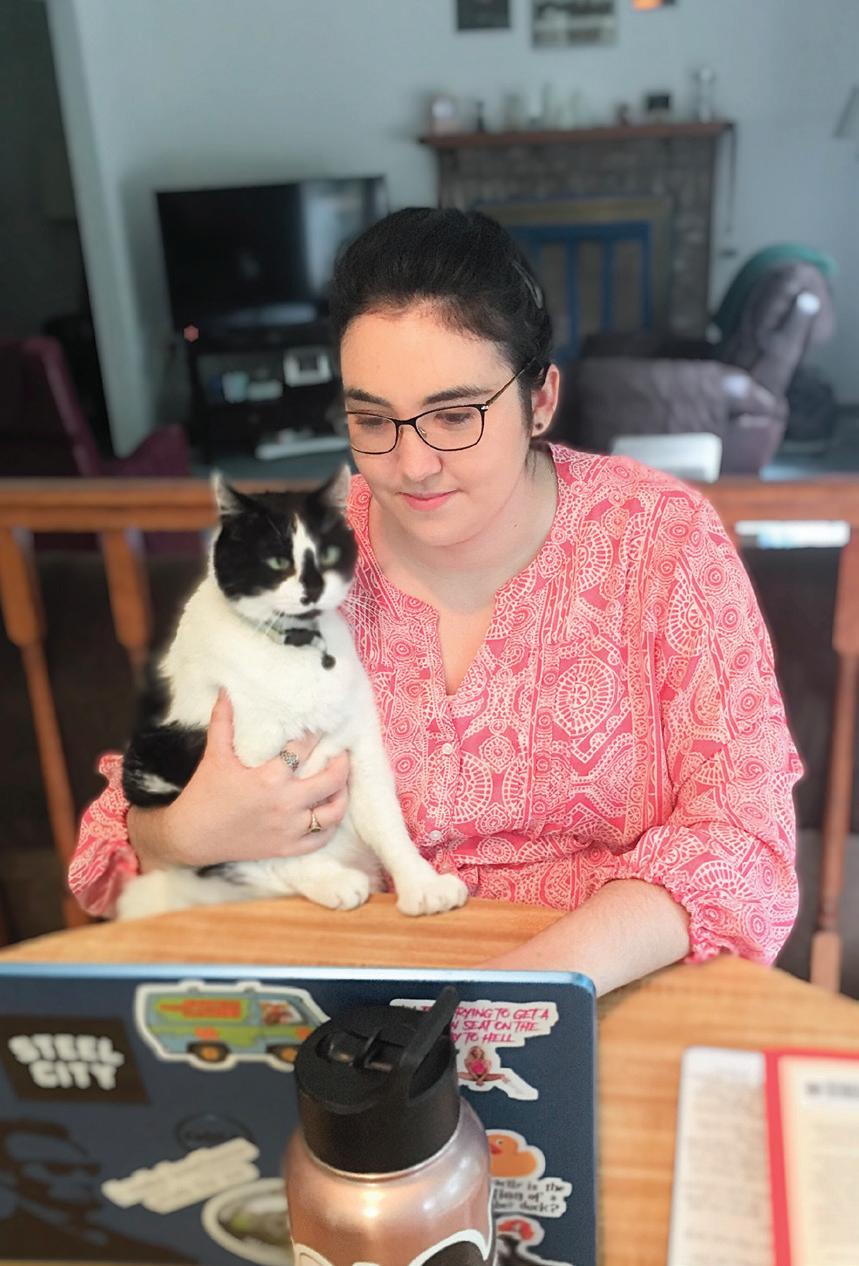 ¾ Meg Peterson
¾ Meg Peterson
To support the School of Education’s Student Collaborative Space through an online gift, please visit www.shepherd.edu/education-giving-updates/. To learn more about the School of Education, visit www.shepherd.edu/education.
ABOVE: Claire Affinito ’20, pictured with cat Sebastian, created virtual lesson plans with her cooperating teacher at Shepherdstown Middle School during spring 2020. Claire, who was the recipient of several Shepherd University Foundation scholarships and named a McMurran Scholar during her time at Shepherd, was only at the middle school for five days before the COVID19 pandemic shut down the public school system.In March 2020, the world as we knew it came to a sudden and jarring halt as the COVID-19 pan demic began affecting communities nationwide, including our own. As a challenging and often frightening quarantine ensued, the Shepherd commu nity far and wide developed a unique sense of camarade rie born of a host of evolving emotions. Amid personal concerns for friends and family, we worried for the wellbeing of our students, mourned our desolate campus, and ached for our seniors whose final semester of college was irrevocably altered.
And yet our rich institutional history reminds us that we have faced similar hardship in the past. The Shepherd Uni versity Archives and Special Collections contains records detailing how the lives of students, faculty, and alumni were affected during the influenza epidemic of 1918-1919. Archived issues of The Picket and the Cohongoroota are peppered with glimpses into the lives of Shepherd students, faculty, and alumni from this time period, from class notes to editorials to memorials to the dead.
Recalling this virtual time capsule housed in the uni versity’s Scarborough Library, archives reference librar ian Frances Marshall was inspired to gather personal accounts from the Shepherd community about their expe riences during the COVID-19 pandemic. She created a short impact survey and invited students, alumni, faculty, and staff to take part. Responses will be placed in a scrap book held at the archives for research and remembrance.
“As a researcher, I considered how I would want pri mary source material from this time,” said Frances. “Not just what happened and when, but how people were coping as well.”
The responses received by Frances reference such modern-day concepts as distance learning, teleworking, and Zoom meet-ups. But the underlying emotion within reminds us that we are not so very different from our counterparts a century ago. Yes, the Shepherd commu nity has faced such hardship before—and we have per severed. ¾ Kristin Alexander
The initial lockdown of the state of Maryland came as a shock and we scrambled to move our studio so we could work from home. Since mid-March things have calmed and a ‘new normal’ has taken shape. Generally speaking, once I was working from home, my usual work flow of editorial illustrations, posters, and various campaigns con tinued more or less the same. My wife, Joyce [Hesselberth], a professor at the Maryland Institute College of Art, found it dif ficult to demonstrate art techniques online via distance learn ing, but she adjusted and was even able to virtually welcome a guest illustrator to one of her classes. She has also contin ued to write and illustrate picture books, which is something that brings her great joy. We’ve mainly been focusing on what we can do and feel it’s important to acknowledge that we are fortunate overall—we know that others have been impacted much more than we have. And as Maryland reopens we’re finding a return to some bit of normalcy—going into work, getting take-out, and making future plans! ”
¾ David E. Plunkert ’87 Baltimore, Maryland
“I miss my students. They left for spring break and never came back! They were a wonderful bunch of lively, unique, interesting people. They were grow ing in their skills and contributing so much to the classroom atmosphere just by being themselves.”
¾
Patricia Fridgen Adjunct Faculty Department of CommunicationRIGHT: Alumnus David E. Plunkert ’87 created this illustration, titled The Engineers Taking on the Ventilator Shortage, for The New Yorker magazine. Dave is an award-winning, globally renowned illustrator and graphic designer whose work has appeared in advertising campaigns for Fortune 500 companies, as well as major newspapers, magazines, and recording labels. As a co-founder of Spur Design in 1995 with his wife Joyce Hesselberth, Dave has also shared his talents as an adjunct professor at the Maryland Institute College of Art and his alma mater, Shepherd University.
During the COVID-19 pandemic, Dave was commissioned to design several illustrations for both local and national publications. These illustrations capture various areas impacted by the pandemic, including food insecurity, big data, and medical equipment. To learn more about Dave’s work, visit spurdesign.com or www.davidplunkert.com
“
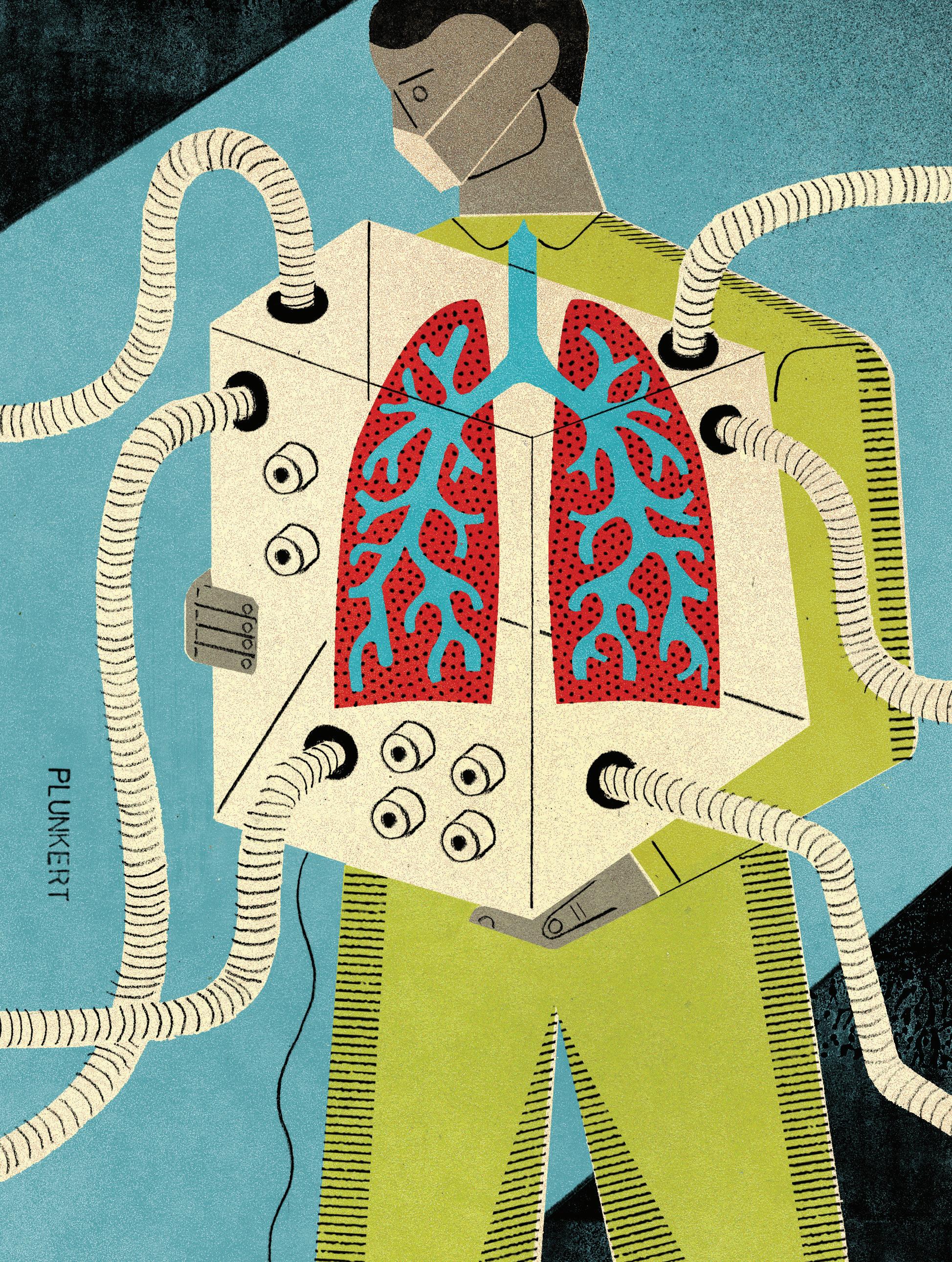
THIS PAGE: Clips from the Cohongoroota yearbook and The Picket newspaper recount how the influenza pandemic of 1918-1919 affected students, faculty, and alumni. Coupled with World War I, the pandemic had a major impact on Shepherd and its community, just as COVID-19 impacts us today.
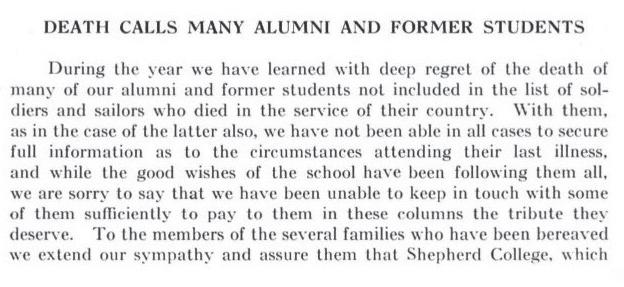
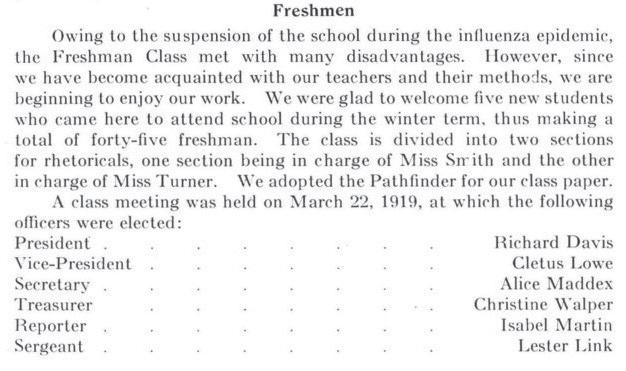
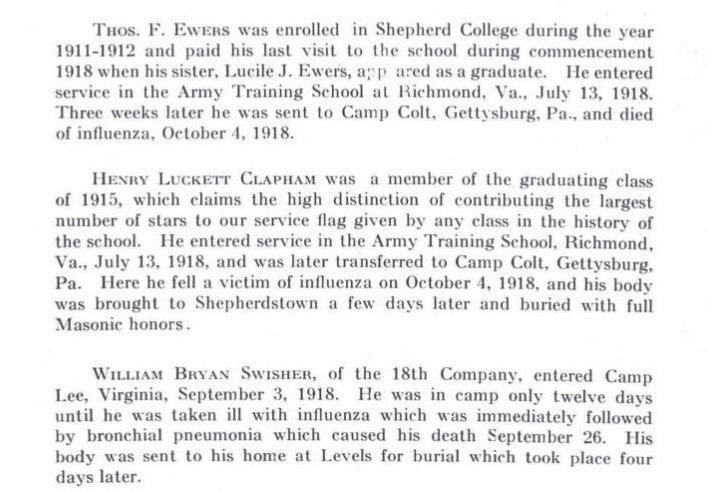

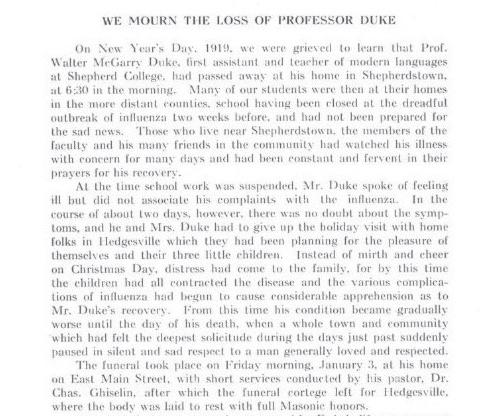
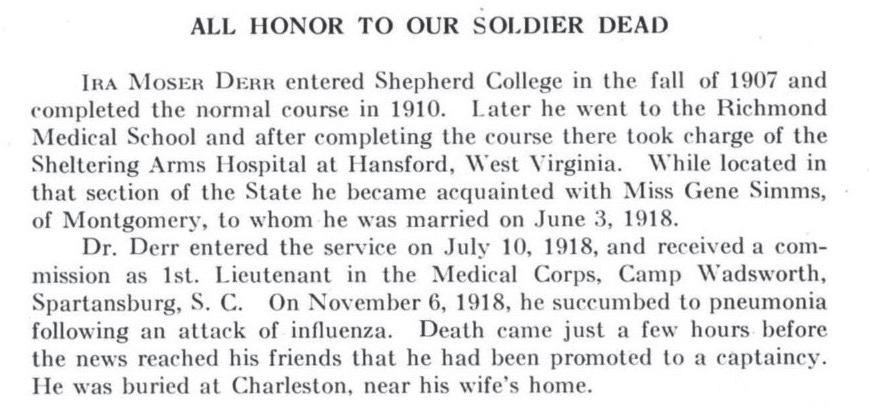
The Shepherd University Archives and Special Col lections are a component of the university’s library system endowed and strengthened by the Scarbor ough Society, Shepherd’s friends of the library orga nization. To learn more about the Scarborough Soci ety, visit shepherduniversityfoundation.org.
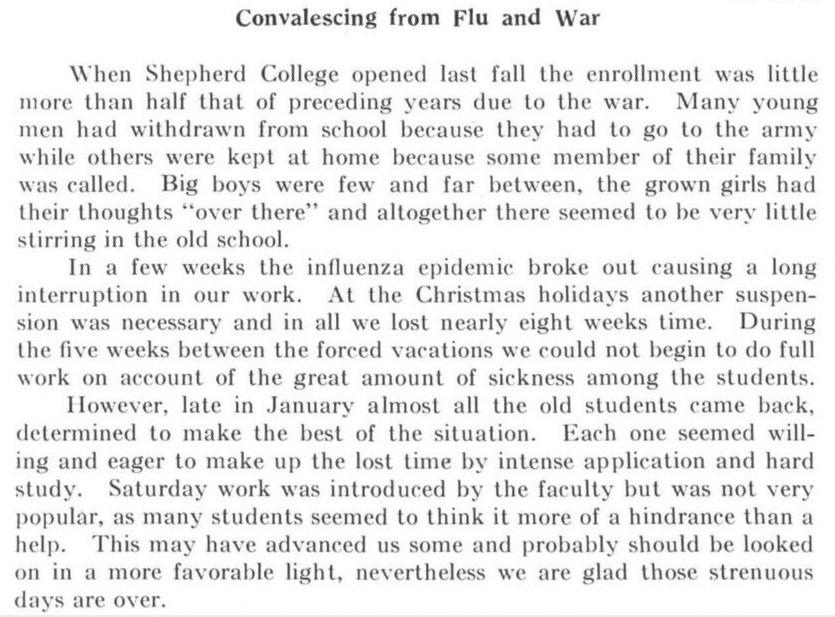
“
As a former Shepherd student now living overseas, the main impact I have felt from COVID-19 is the fact that I am now working from home and not allowed into my office. As I work in the international humanitarian field, I am directly involved in the response to the pandemic where I currently reside in the Philippines. Given the travel restrictions and limited international air passage services, I find myself cut off from my family in the U.S. If anyone were to get sick, I would face difficulties getting back, and if a flight were to become available I would need to self-quarantine for two weeks.”
¾ Kevin Howley ’95 Head of Supply Chain for the World Food Programme Manila, Philippines
As an assistant principal, I missed the graduation of our seniors. We instead held a parade and the emo tions ran strong. My daughter missed her friends since she is only in kindergarten. I learned a great deal of patience with two small children while working from home. My husband is an educator as well so zooming with classes was a must. We missed family and social functions. On a posi tive note, we spent more time as a family.”
¾ Mary Beth Group ’03 Kearneysville
I like online classes because they’re convenient and allow me to save on gas by not having to drive to campus every day. Also, I work at a grocery store and have gotten more hours and an increase in pay.”
¾ Anthony Ledsome ’22 Computer Information Science Major Bunker Hill
Zoom has come in handy for making huge group calls so friends can still hang out and talk. I have a Zoom call with my friends every Thursday so that we can hang out and get a good laugh. Because that’s what everyone needs right now—a good laugh.”
¾ Robert Harsh ’23
Biology/Pre-Medicine Major Williamsport, Maryland
Having two elderly parents living two hours away, we do weekly phone calls but no direct contact for several months.”
¾ Chris Seymour ’78 Newark, Maryland
Our lives have changed dramatically as we’ve learned to navigate this new reality resulting from the COVID-19 pandemic. Our students are also facing challenges. Many of our alumni and friends have asked what they can do to support Shepherd students at this time. The Shepherd Student Relief Fund supports immediate stu dent needs related to the COVID-19 pandemic.
Your charitable gifts to this fund will be incredibly meaningful and appreciated by our most vulnerable students. Any financial con tribution you choose to offer will play a vital role during this unprecedented crisis. To make an online gift through the Shepherd University Foundation, please visit shepherduniversityfounda tion.org. Thank you for your kindness and con cern for our students.

“
“
“
“
Shepherd University Magazine
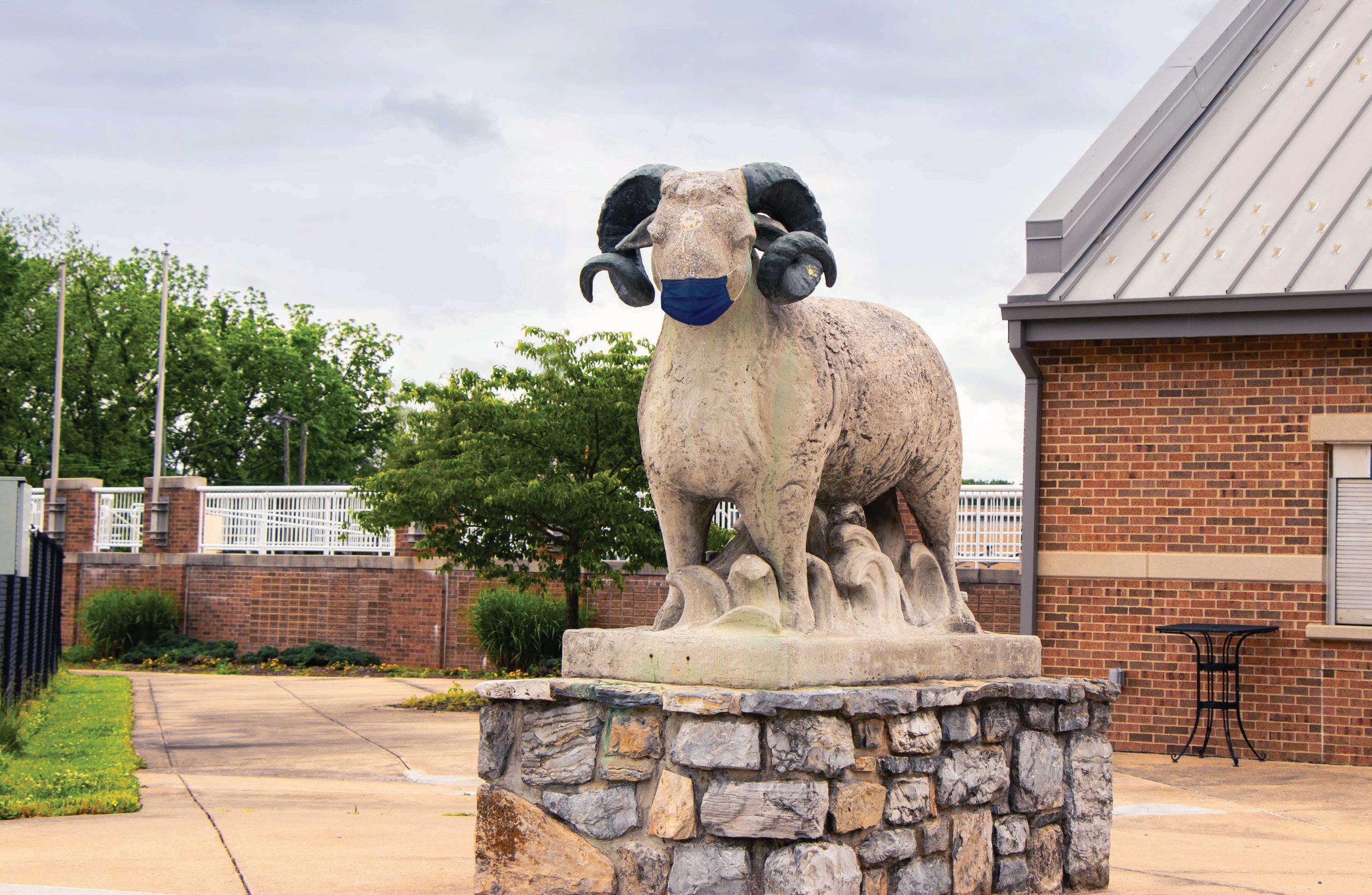
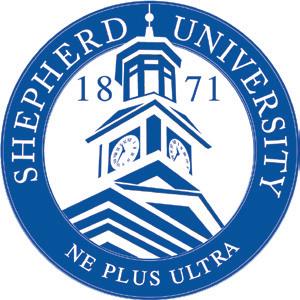
P.O. Box 5000 Shepherdstown, West Virginia 25443-5000
800-344-5231 304-876-5000 www.shepherd.edu shepherduniversityfoundation.org
Nonprofit Organization U.S. Postage PAID
Permit #108 Morgantown, WV
CHANGE SERVICE REQUESTED